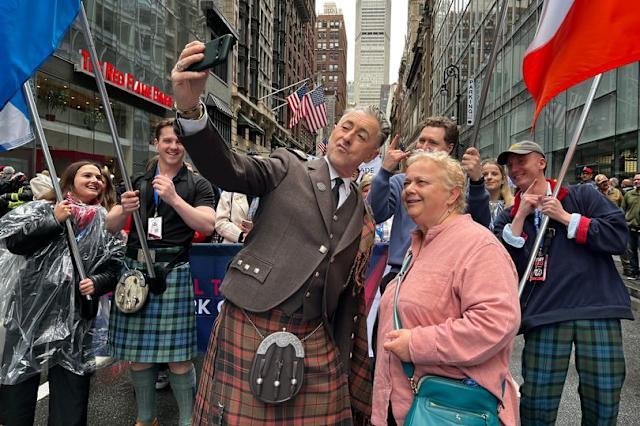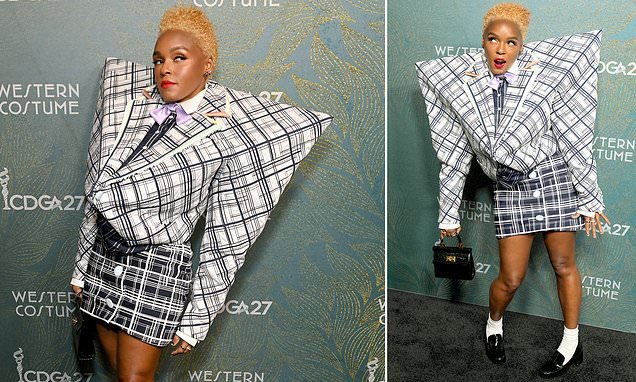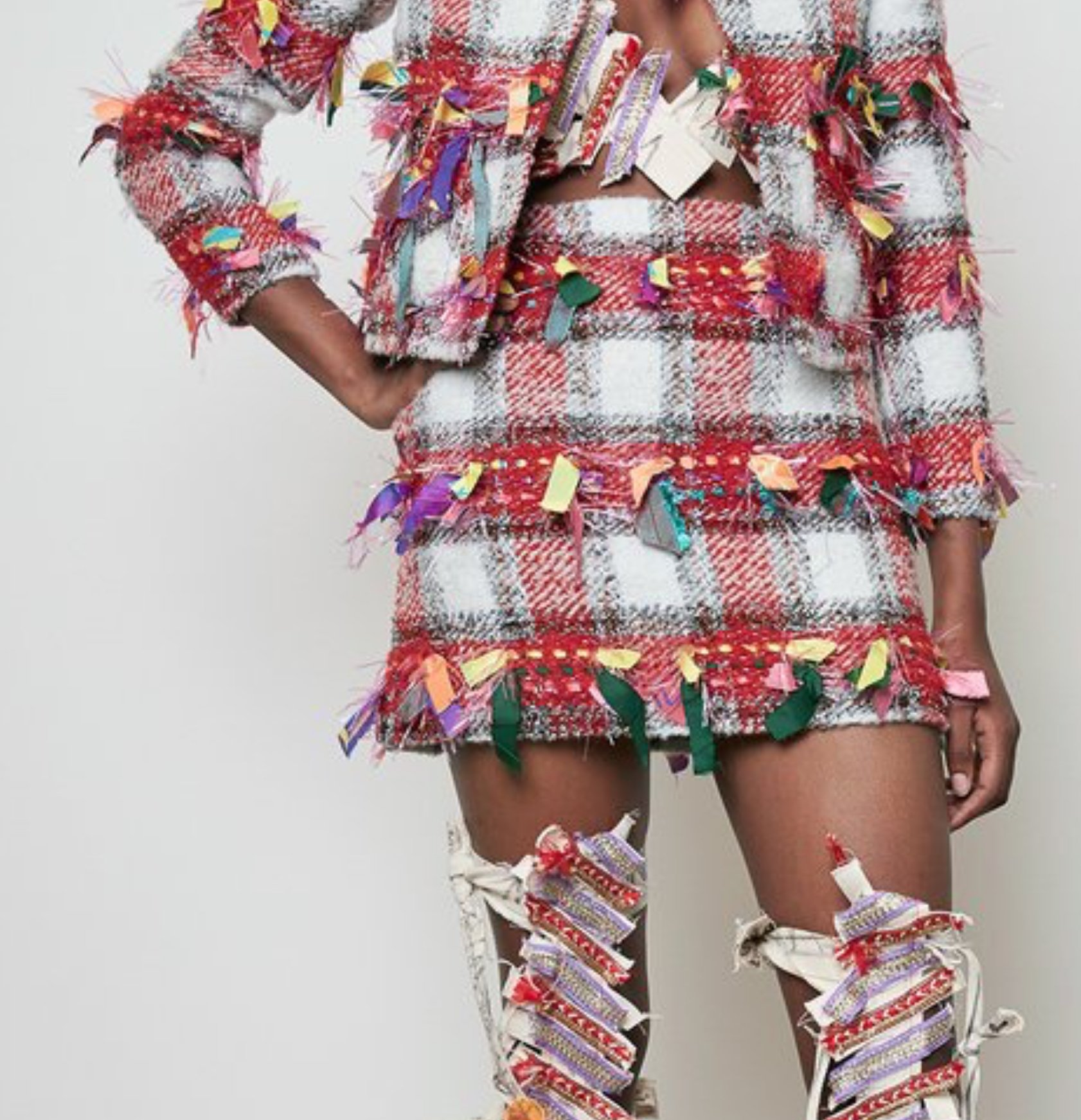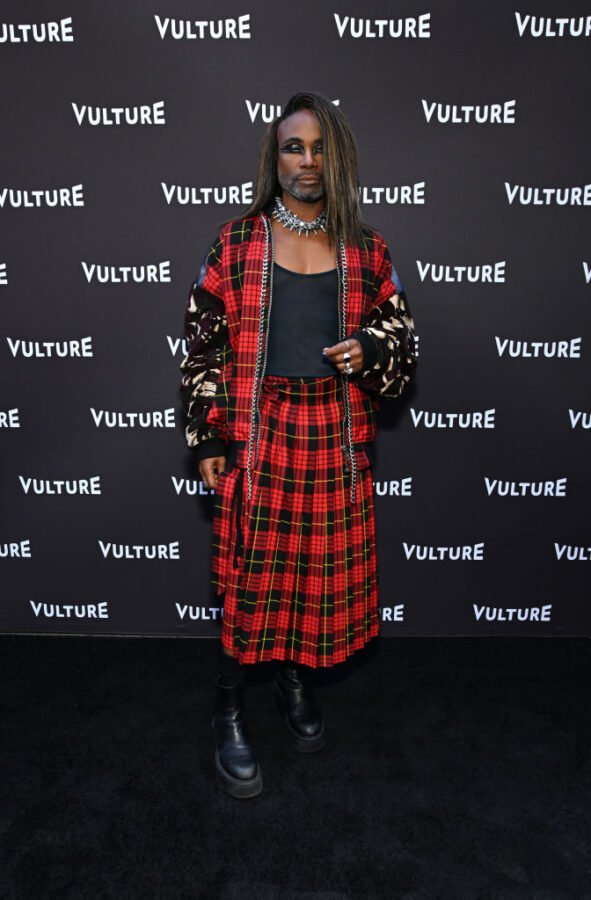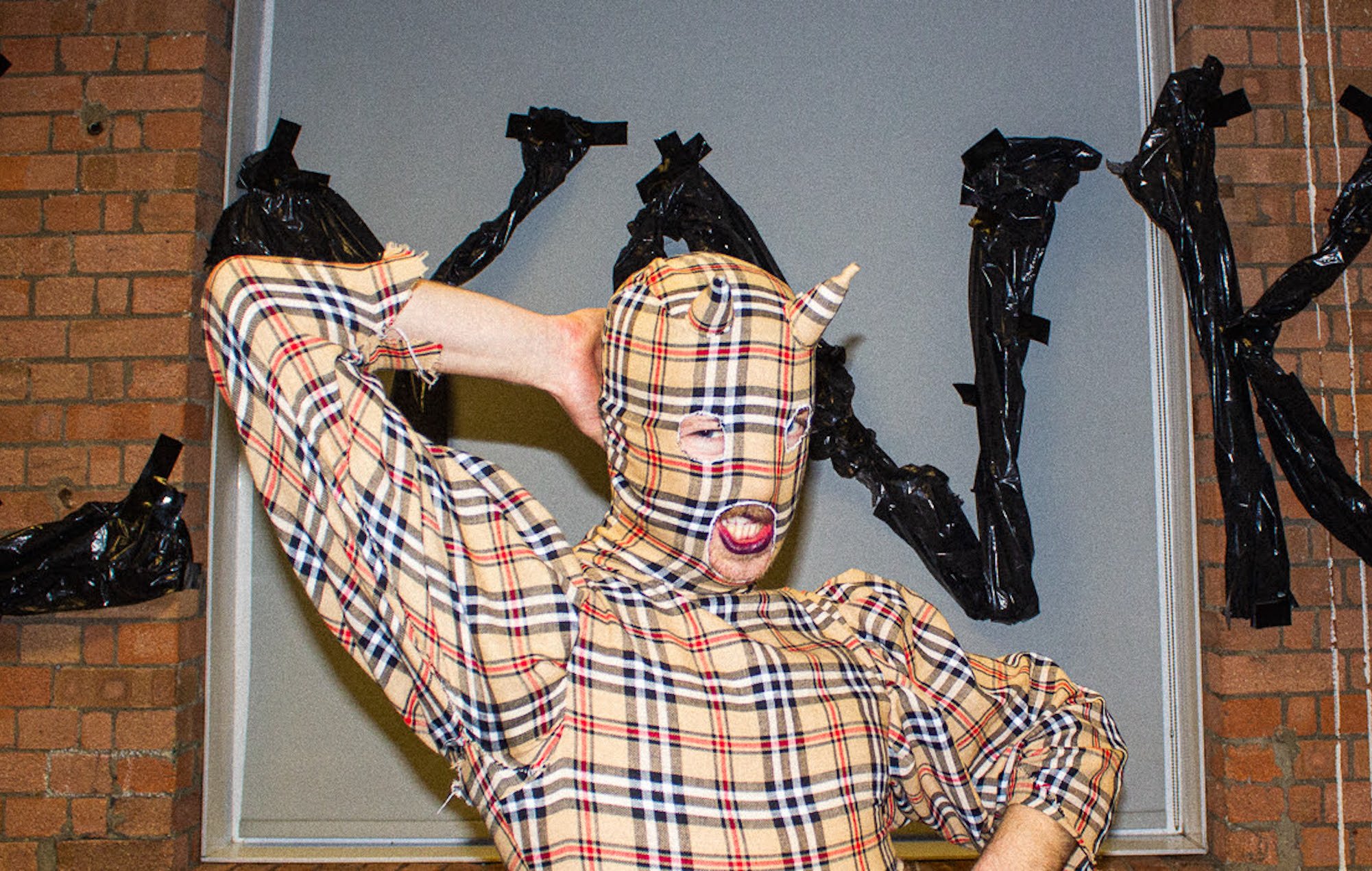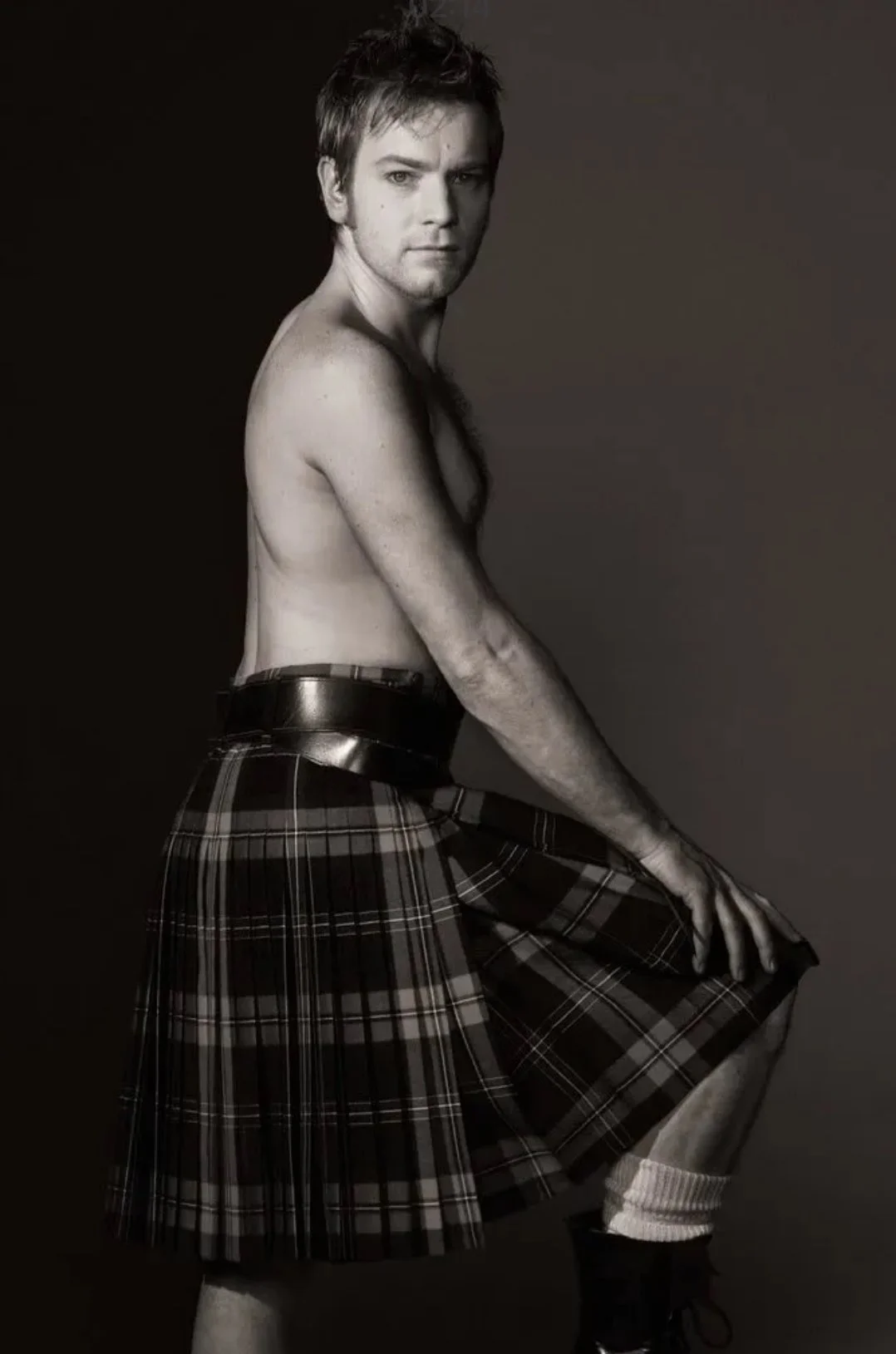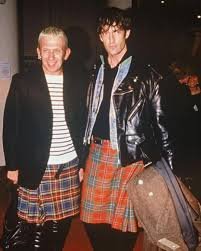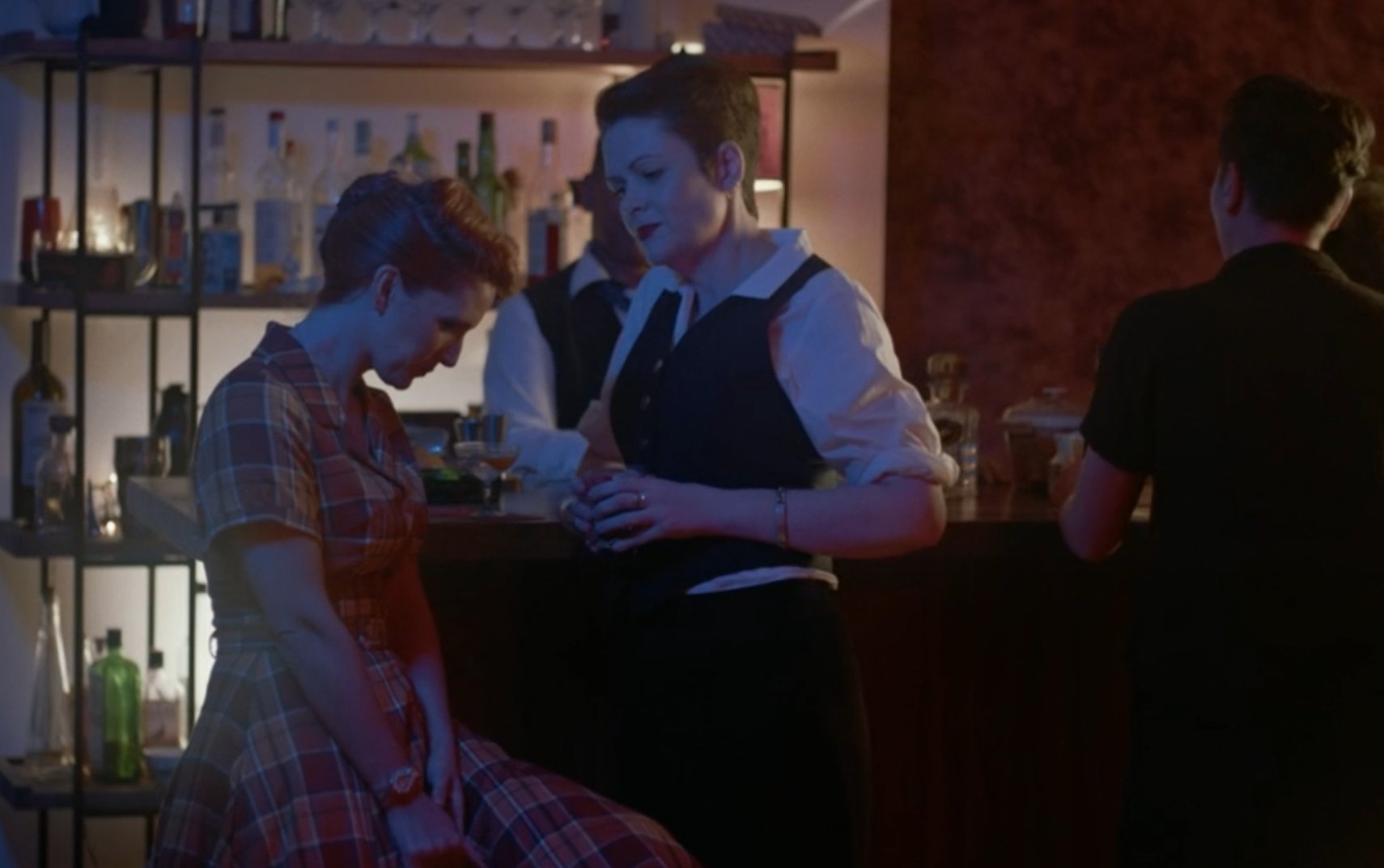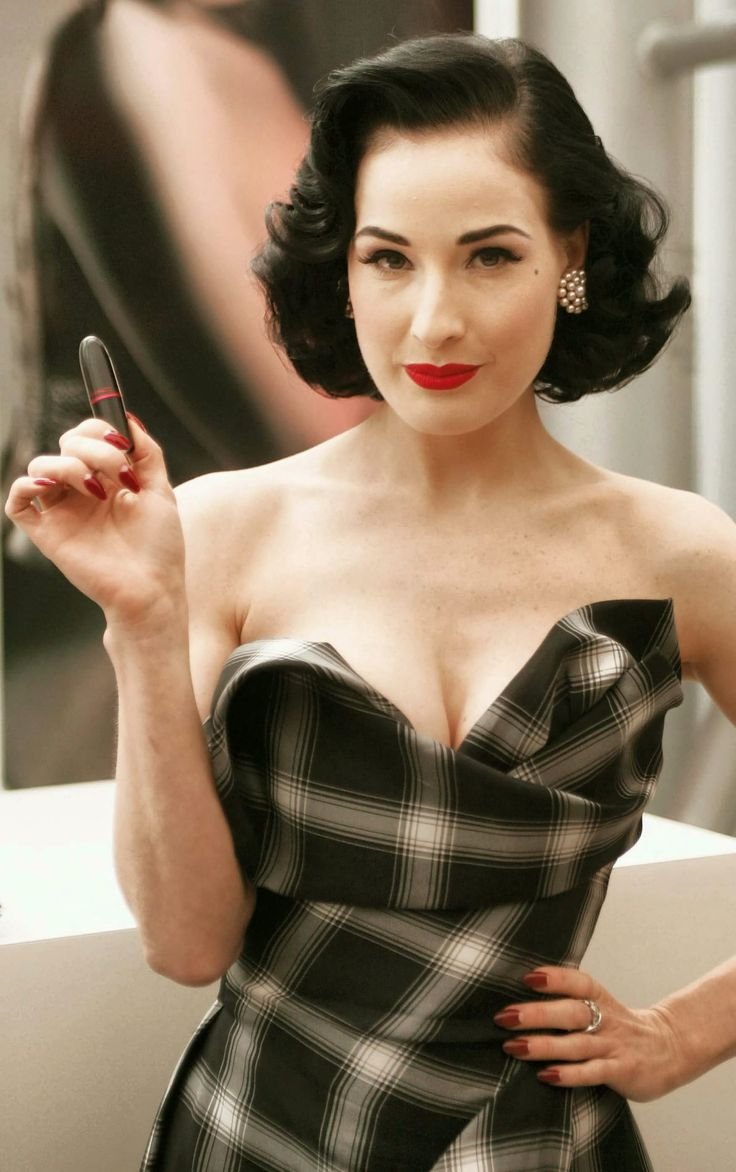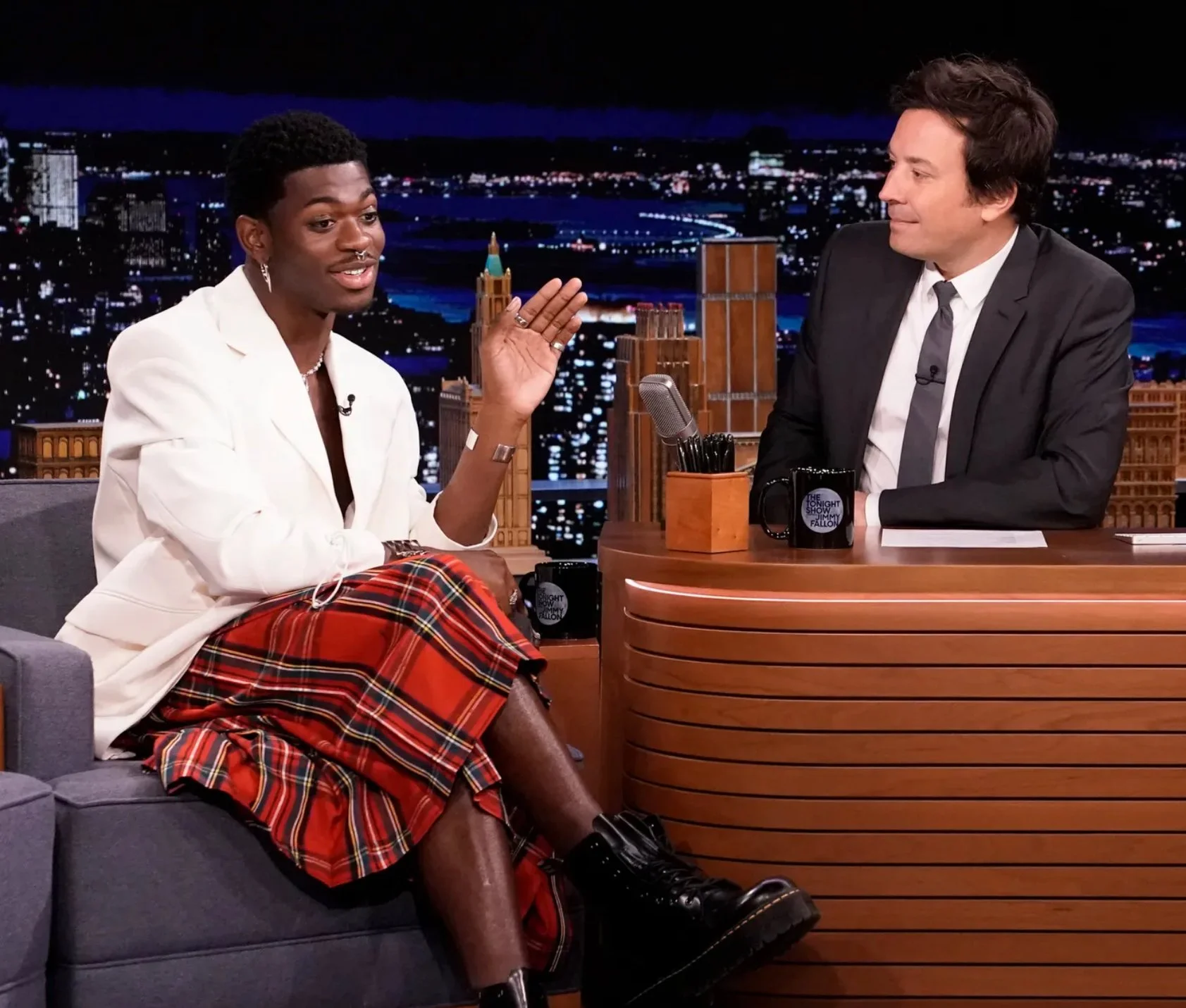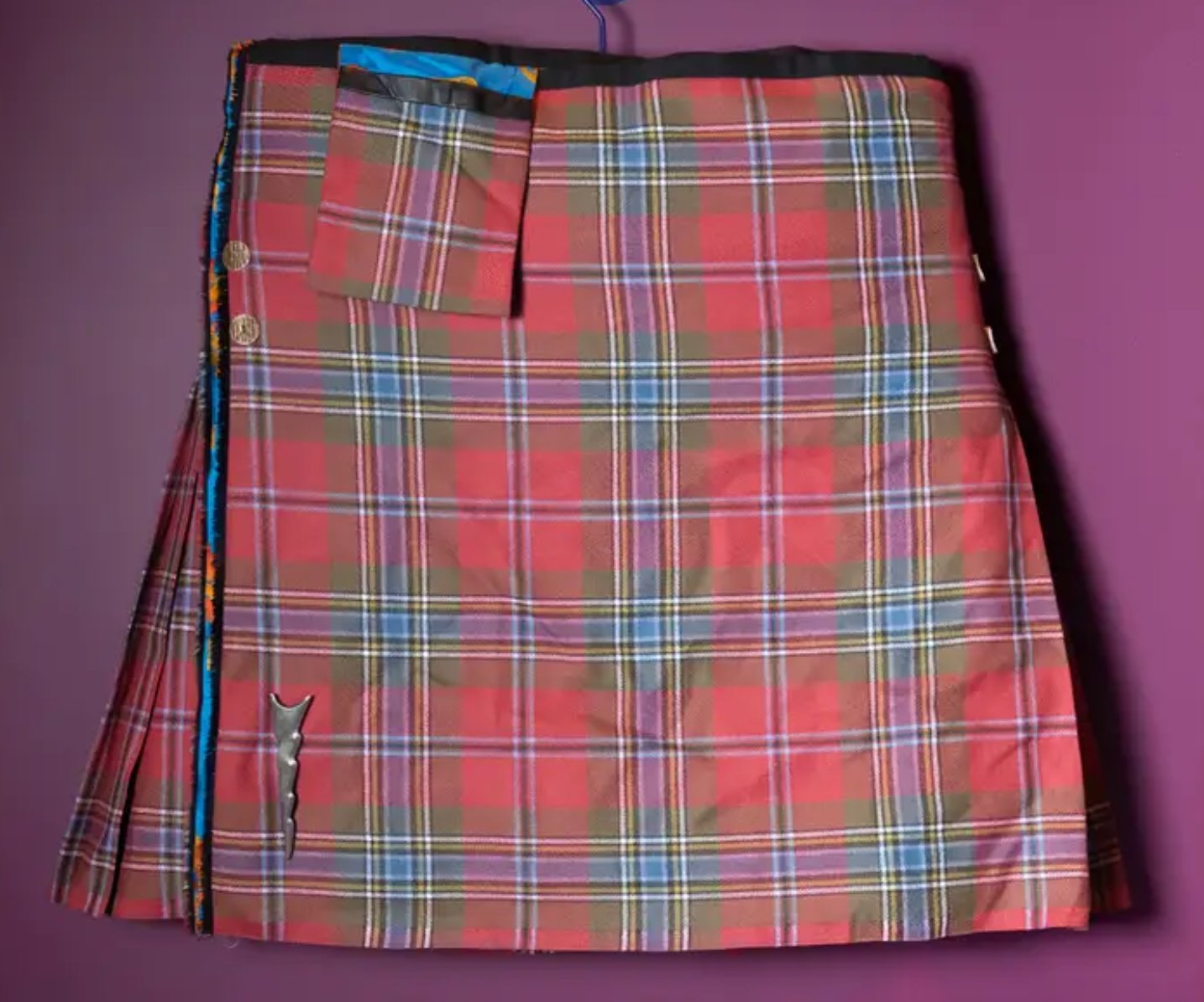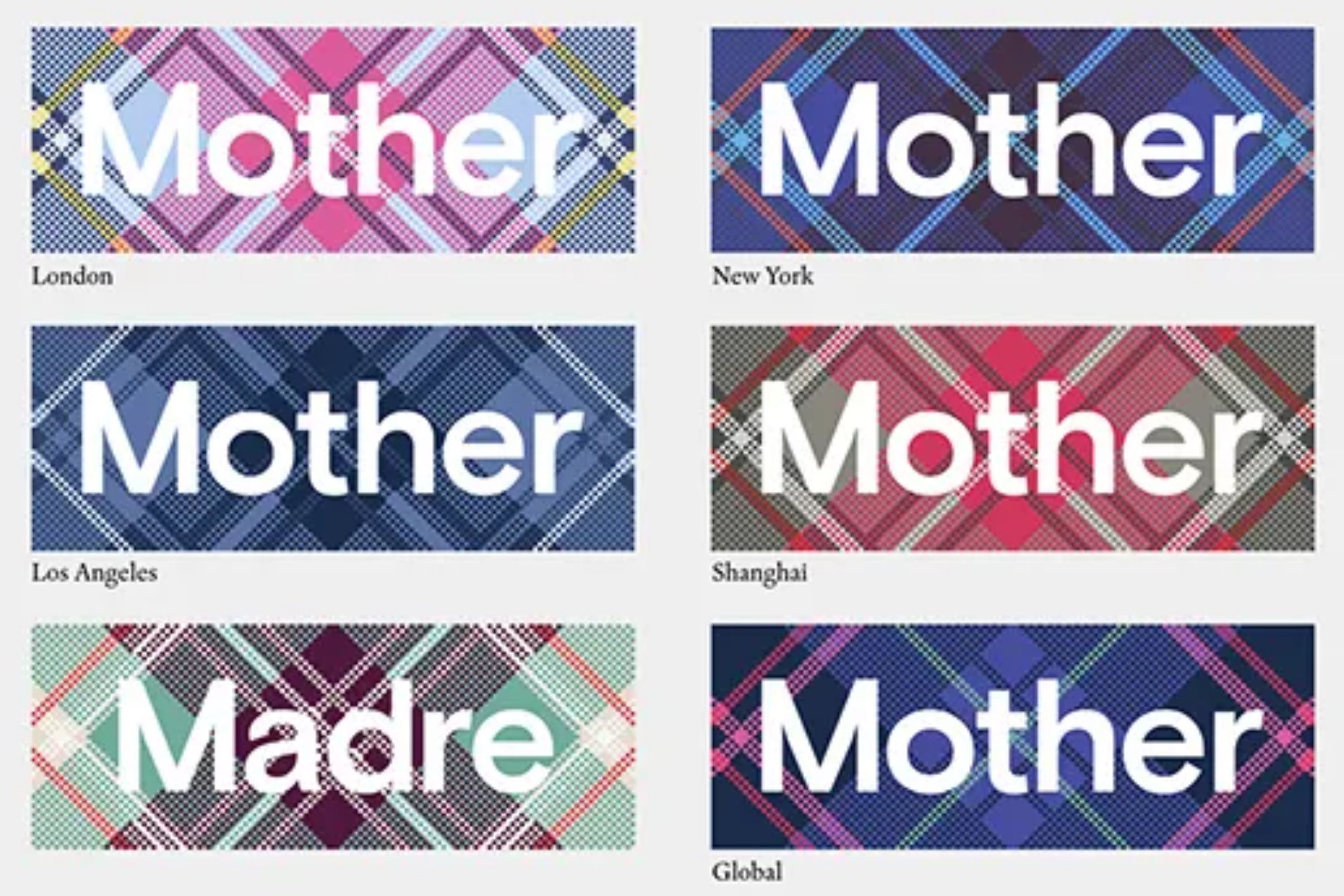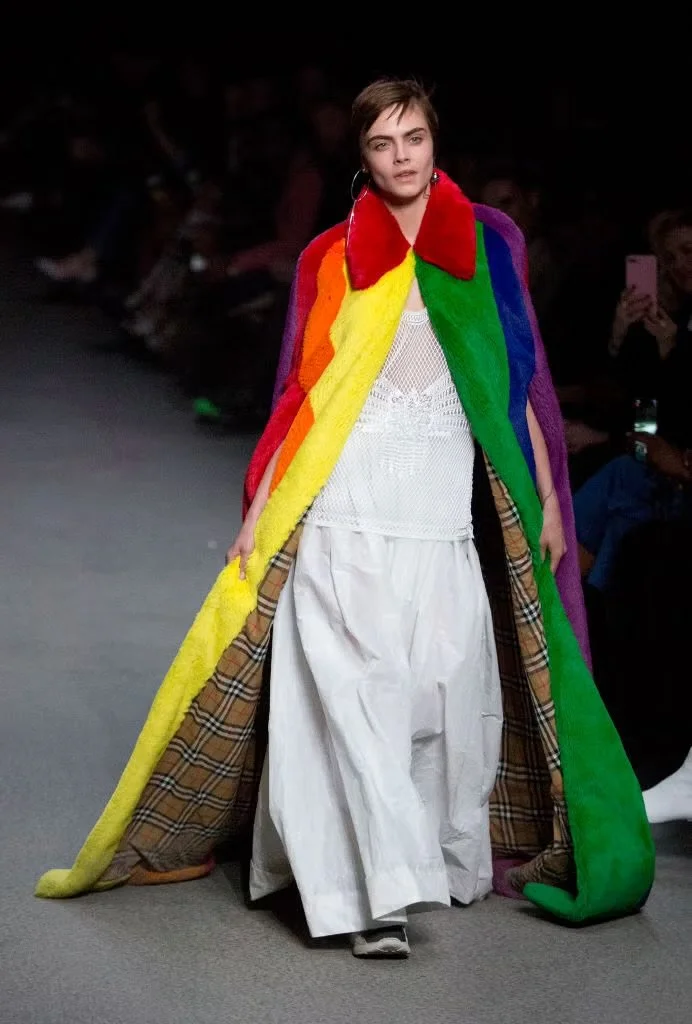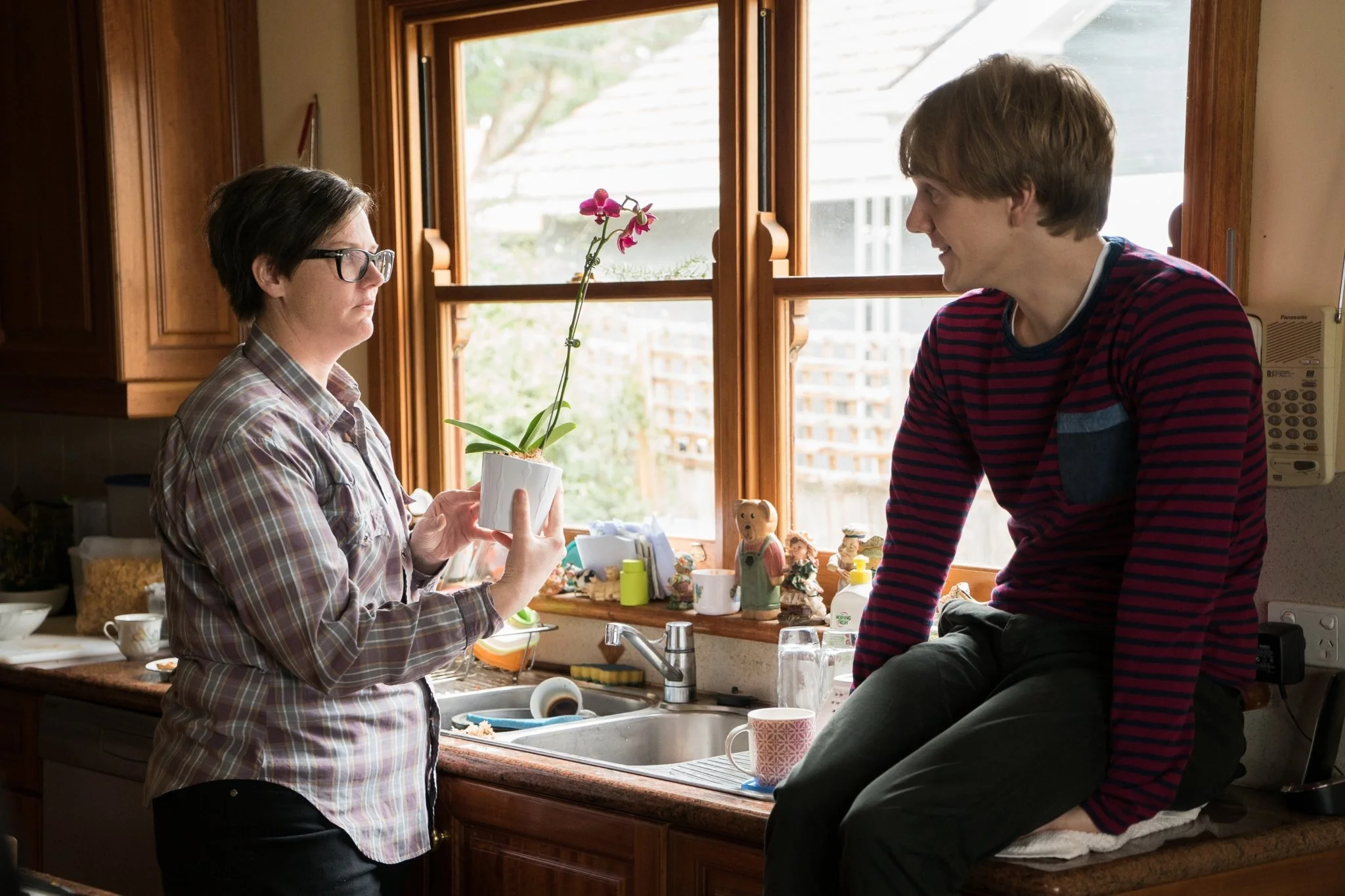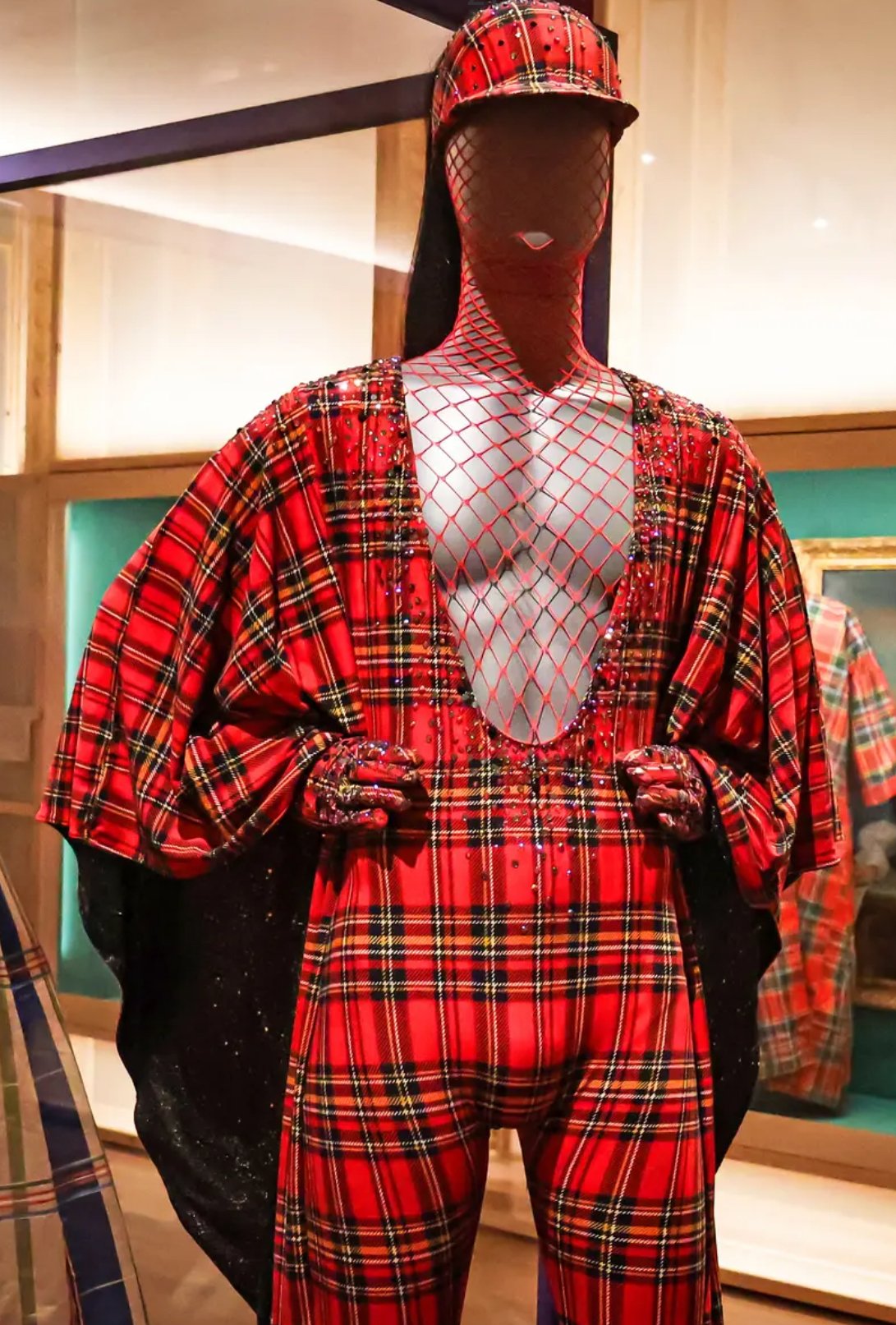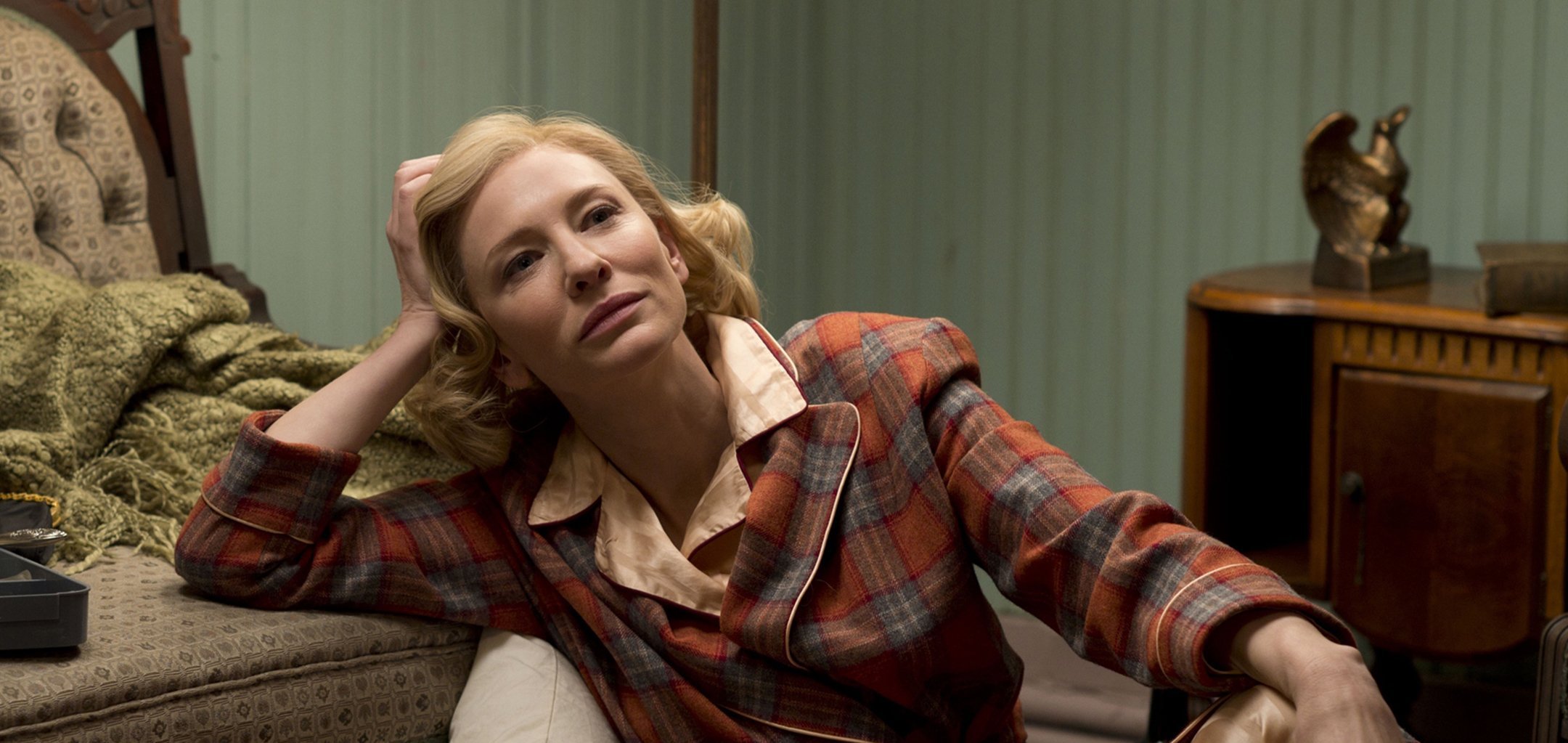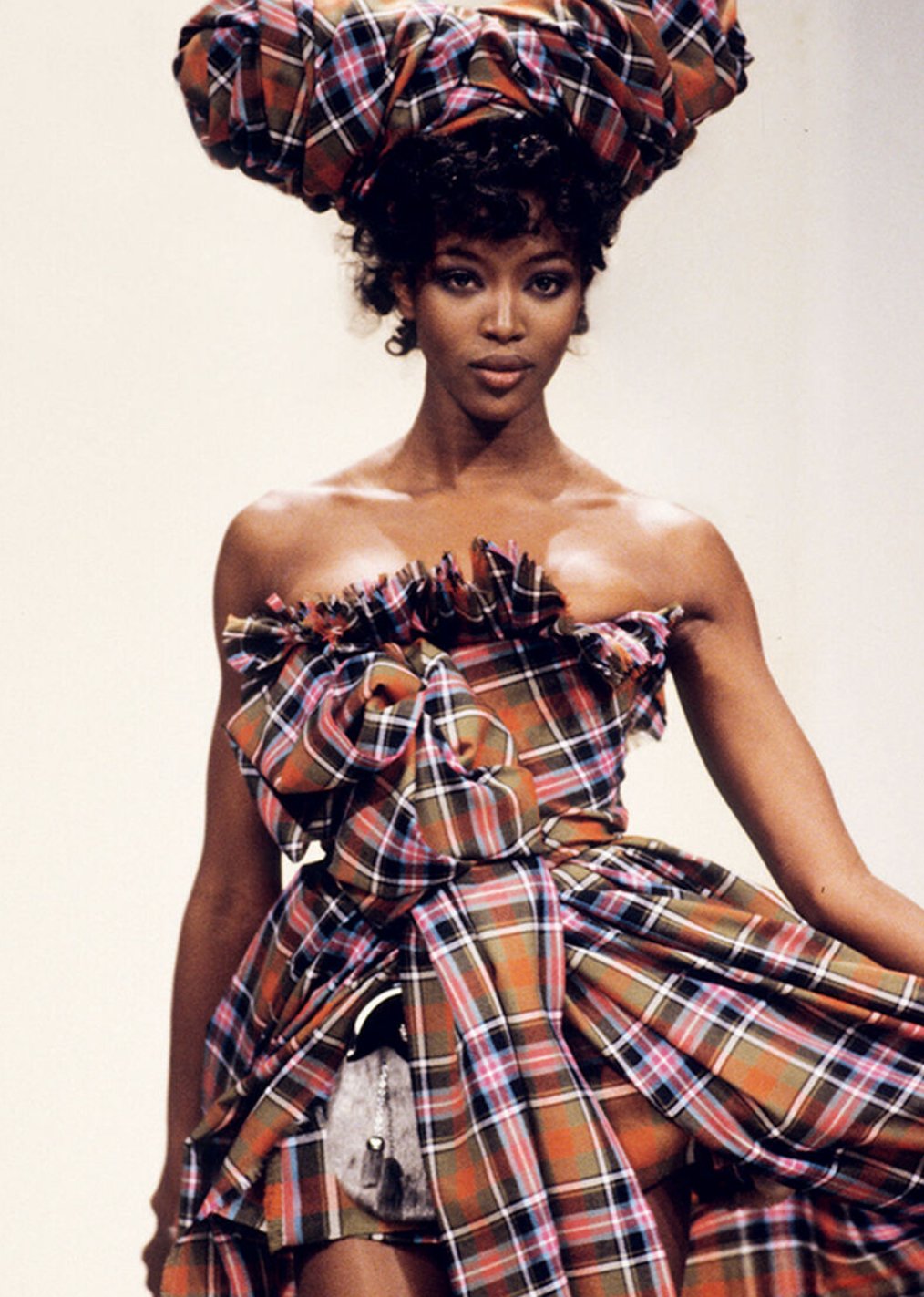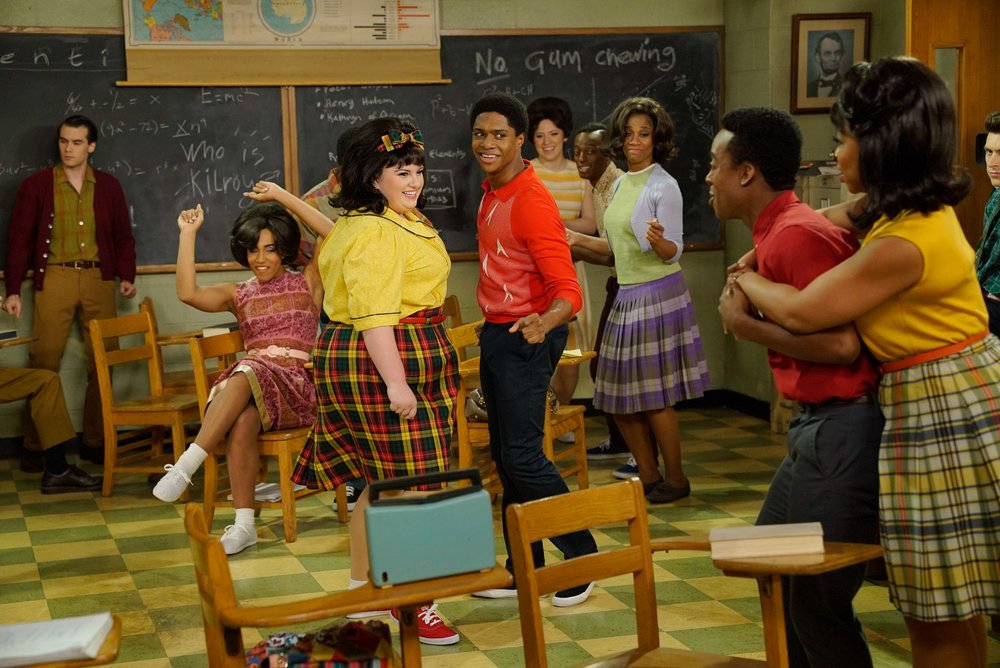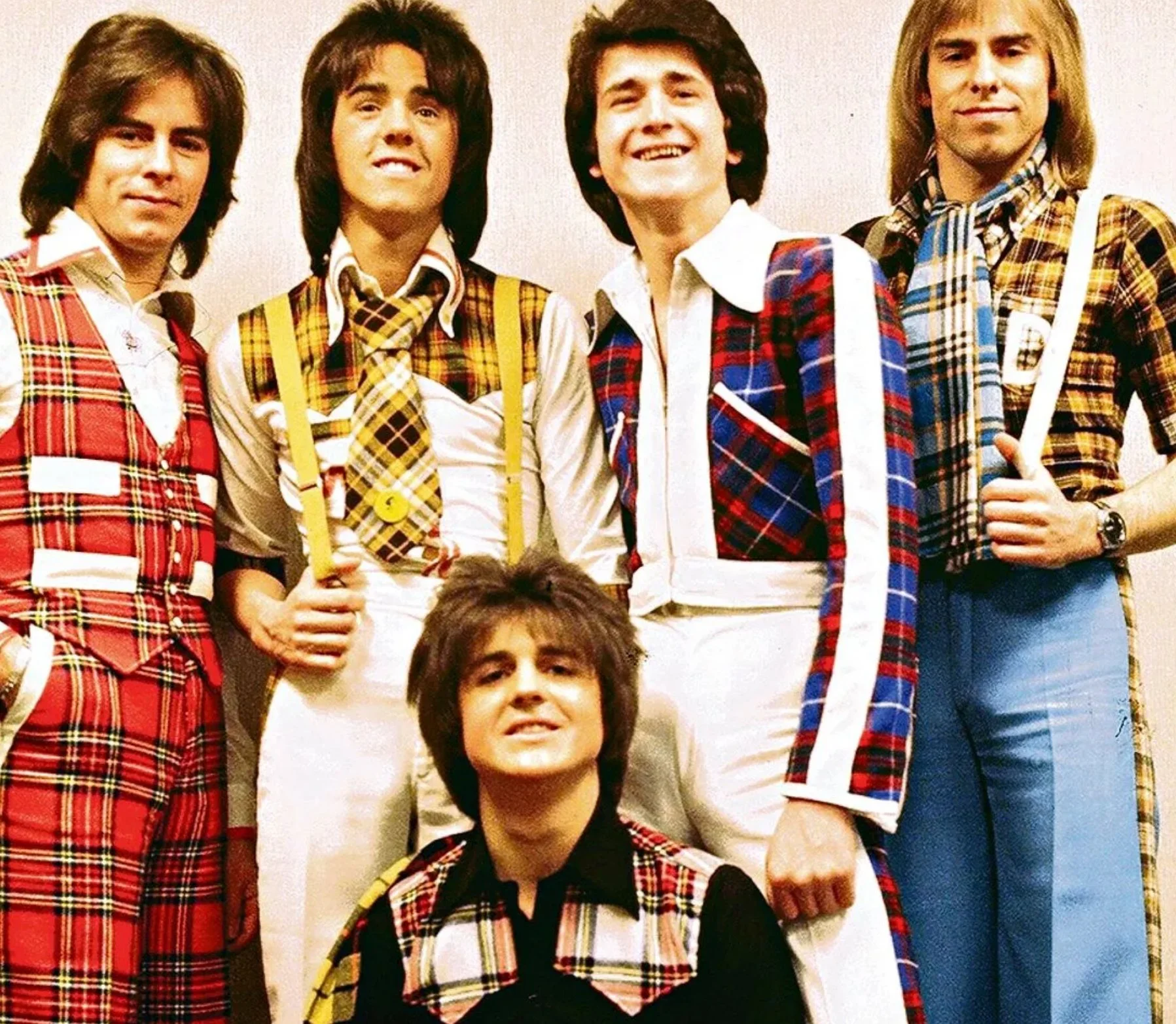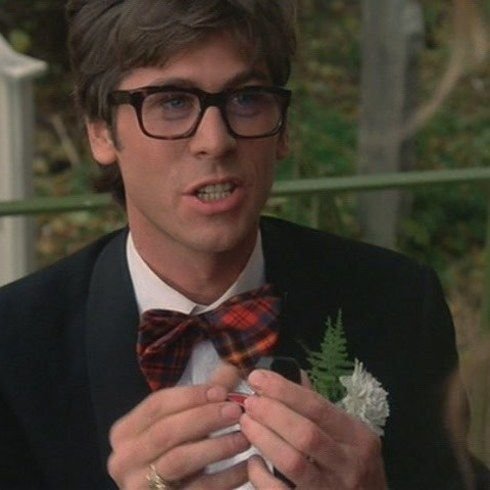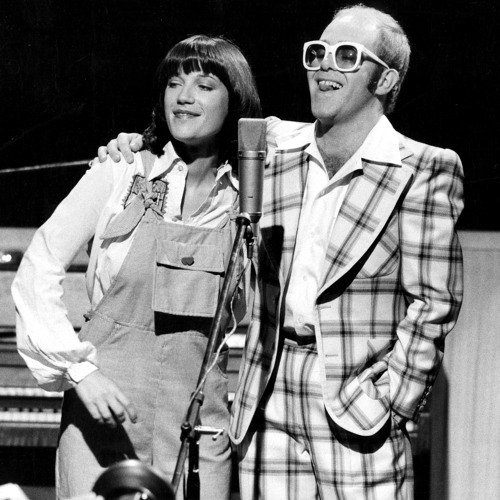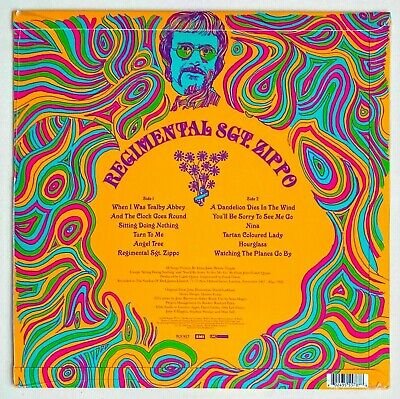A QUEER HISTORY OF TARTAN TIMELINE
Scotland has dressed the world. Although certain parties would love to claim tartan as a conservative political tool, it has a long history of use by the queer community and allies. From plaid flannel shirts worn by lesbians to Alan Cumming in a yellow tartan suit on Traitors to Grayson Perry in a tartan skirt, tartan is a staple of the LGBTQIA+ community. If you want to help stop Scotland being used for the anti-LGBTQIA+ agenda please register a tartan for your queer business or chosen family with the Scottish Government here.
We have 75 and counting. If you have any photos, suggestions or if you would like to donate any tartan items please get in touch. We are putting together a small exhibition.
2025
Alan Cumming at Tartan Day Parade
Alan Cumming, the celebrated Scottish actor and openly queer icon, has long embraced tartan as a vibrant expression of his identity. In 2025, he served as the Grand Marshal of the New York City Tartan Day Parade, donning a custom kilt by 21st Century Kilts and a jacket by Geoffrey Tailor & Kilt Maker, leading the festivities with characteristic flair. Cumming's affinity for tartan extends beyond ceremonial occasions; he frequently incorporates it into his fashion choices, blending traditional Scottish elements with contemporary style. In the television series The Traitors, he showcased an array of tartan ensembles, collaborating with stylist Sam Spector to create looks that melded classic patterns with modern, theatrical flair.
Cumming's sartorial choices reflect his commitment to authenticity and self-expression. He has described tartan as "very punk and very kitsch at the same time," appreciating its versatility and cultural significance. By integrating tartan into his wardrobe with a “huge collection of tartan suits,” Cumming not only honors his Scottish heritage but also challenges conventional fashion norms, embodying a style that is both personal and political. His bold use of tartan resonates within the queer community, symbolizing a celebration of individuality and a reimagining of tradition.
2025
Alan Cumming - Traitors, in a yellow tartan suit
In his role as the host of the American version of The Traitors, Alan Cumming brings his theatrical flair and commitment to diversity to the forefront. Set in a Scottish castle, the reality competition show features Cumming in elaborate, gender-fluid costumes, adding a campy and dramatic tone that resonates with queer aesthetics. Beyond his on-screen presence, Cumming has actively worked to enhance LGBTQ+ representation within the show's cast. Following the early elimination of a prominent trans contestant in a previous season, he advocated for more inclusive casting, resulting in a more diverse lineup in subsequent seasons. Cumming views the show as a platform to celebrate queerness and challenge societal norms, particularly in times of increasing anti-LGBTQ+ sentiments.
2025
Janelle Monáe in a sculptural tartan blazer & skirt
At the 2025 Costume Designers Guild Awards, Janelle Monáe was honored with the Vanguard Spotlight Award, recognizing her as an artist who pushes creative boundaries and inspires both industry insiders and audiences.
Monáe made a striking appearance in a Viktor & Rolf Fall 2024 Haute Couture ensemble, featuring a sculptural blazer with exaggerated, pointed shoulders, paired with a matching mini skirt. This bold outfit marked a return to her signature black-and-white palette, showcasing her fearless approach to fashion.
Known for her gender-fluid style and advocacy for LGBTQ+ rights, Monáe's choice of attire at the event underscored her commitment to challenging traditional fashion norms and celebrating individuality. Her presence and recognition at the awards highlight her influence in both the entertainment and fashion industries.
2025
Grayson Perry CBE RA in tartan skirts
Sir Grayson Perry, born on March 24, 1960, in Chelmsford, Essex, is a prominent British artist renowned for his ceramic vases, tapestries, and cross-dressing. His works often delve into themes of identity, gender, and social status, blending autobiographical elements with broader societal commentary.
Perry gained significant recognition in 2003 when he won the Turner Prize, marking the first time a ceramic artist received the award. Beyond his visual art, he has authored books such as Playing to the Gallery and The Descent of Man, and presented television series like All in the Best Possible Taste and Grayson Perry: All Man, further exploring contemporary British culture and identity. Grayson receiving the Freedom to the City of London and on the cover of Country Life Magazine, wearing tartan in both.
2025
Louise Gray, deconstructed tartan skirt-suit
https://www.iamlouisegray.com
Hailing from Fraserburgh, Scotland, Gray graduated from Central Saint Martins' MA Fashion program in 2007 under the mentorship of Professor Louise Wilson OBE. She quickly gained recognition for her vibrant, eclectic designs that blend punk influences with a DIY aesthetic. Gray's work often incorporates bold colors, intricate embellishments, and handwritten slogans, reflecting her commitment to individuality and self-expression. Her collections have been showcased at London Fashion Week, and she has collaborated with brands like Topshop and artists such as Linder Sterling. Beyond fashion, Gray engages in multidisciplinary art, including writing and sound, and co-founded the DIY record label Adrenaline Darling Records to support queer artists. She also teaches part-time at Central Saint Martins, nurturing the next generation of designers.
2024
Eleanor Medhurst, Dressing Dykes in a tartan jacket
https://www.vogue.com/article/eleanor-medhurst-unsuitable-lesbian-fashion
Eleanor Medhurst is a UK-based lesbian fashion historian known for her work exploring queer identity through clothing. She runs the blog Dressing Dykes and published her first book, Unsuitable: A History of Lesbian Fashion, in 2024. With degrees from the University of Brighton, Medhurst has contributed to exhibitions like Queer Looks and Queer the Pier and has been featured in Vogue. She gives talks at institutions like Tate Modern and shares her research widely on social media. Medhurst lives in Brighton with her wife, Lilith.
2024
Billy Porter in a red skirt suit
Billy Porter, born in 1969 in Pittsburgh, Pennsylvania, is a multifaceted American actor, singer, and director whose career spans theater, television, and film. He gained widespread acclaim for his portrayal of Lola in the Broadway musical Kinky Boots, earning a Tony Award for Best Actor in a Musical in 2013 and a Grammy Award for Best Musical Theater Album in 2014. Porter's role as Pray Tell in the FX series Pose further solidified his status, making him the first openly gay Black man to win the Primetime Emmy Award for Outstanding Lead Actor in a Drama Series in 2019. In 2022, he made his directorial debut with Anything's Possible, a coming-of-age film centered on a Black trans girl, reflecting his commitment to inclusive storytelling. Beyond his artistic achievements, Porter is a dedicated LGBTQ+ activist. He has been open about his experiences, including coming out at 16 during the AIDS crisis and living with HIV since 2007. Porter uses his platform to advocate for marginalized communities, emphasizing the importance of visibility and representation. His activism includes work with organizations like The Elizabeth Taylor AIDS Foundation and the Entertainment Community Fund. In 2024, he received the Isabelle Stevenson Award at the Tony Awards, recognizing his humanitarian efforts and contributions to the LGBTQ+ community.
2024
Lynks in a full tartan body suit, balaclava and horns
https://www.nme.com/blogs/nme-radar/lynks-tongue-in-cheek-queer-bangers-for-the-others-2859982
Lynks is a queer, genre-defying pop artist known for their theatrical performances, satirical lyrics, and bold exploration of LGBTQ+ themes. Emerging from Bristol's indie scene, they have gained recognition for blending electronic beats with sharp commentary on queer identity, hookup culture, and societal norms.
Their debut album, Abomination, released in April 2024, delves into complex themes of queer pride and shame, offering a candid look at modern queer life. Lynks' performances are characterized by elaborate costumes and masks, creating a unique and immersive experience for audiences.
2024
Ewan McGregor in a kilt
Ewan McGregor has had a long-standing connection to queer culture through the roles he’s chosen and the respectful way he approaches them. From his early breakout performance as the glam rock icon Curt Wild in Velvet Goldmine to the heartfelt portrayal of a gay conman in I Love You Phillip Morris, McGregor has brought queer characters to life with sensitivity and charisma. Though he does not identify as queer himself, his willingness to take on complex, queer roles—without reducing them to stereotypes—has earned him a place in queer cinematic history. One of his most significant contributions to queer representation came with his portrayal of legendary fashion designer Roy Halston Frowick in the Netflix series Halston. Produced by Ryan Murphy, the series follows the life of the openly gay designer, from his creative highs to his personal struggles with love, fame, and AIDS-related illness. McGregor’s performance was widely praised,
2024
Suzi Ruffell in a tartan suit
Suzi Ruffell is a British comedian, writer, and actress known for her sharp wit, engaging storytelling, and contributions to LGBTQ+ representation in comedy. Born on January 18, 1986, in Portsmouth, England, she began her stand-up career in 2008 and has since become a prominent figure on the UK comedy circuit, with appearances on shows like Live at the Apollo, Mock the Week, and The Jonathan Ross Show.
Openly gay, Ruffell often incorporates her experiences into her comedy, discussing topics like coming out, relationships, and societal expectations. She hosts the podcast Out with Suzi Ruffell, where she interviews LGBTQ+ individuals about their lives and experiences, aiming to create a sense of community and understanding.
2024
Dior show in Scotland featuring tartan
https://www.theguardian.com/fashion/article/2024/jun/04/feistily-gorgeous-dior-show-renews-auld-alliance-scotland
It is not every Dior show that opens with a skirl of bagpipes, three different ways to wear violet tartan, and a sporran dangling from a belt in place of a clutch bag tucked under the arm. Dior’s first catwalk show in Scotland for 70 years, held in Perthshire on Monday evening, was a feistily gorgeous affair.
Dior has shown strong support for the LGBTQ+ community through inclusive campaigns, transgender representation, and educational programs for staff. The brand collaborates with queer icons, celebrates Pride, and supports initiatives like mentorship for trans youth, making it broadly queer-friendly in both its messaging and internal culture.
2024
Mal Glowenke, Made It Out Podcast in matching tartan PJs
Made It Out is a queer podcast hosted by Mal Glowenke, a Texas-raised lesbian now based in Los Angeles. Each week, Mal engages in candid conversations with queer individuals across the country, delving into topics such as relationships, religion, sex, and culture, all from a lesbian perspective.
The podcast features a variety of guests, including notable figures like Dylan Mulvaney, who joined Mal to discuss her journey with religion and spirituality, from her Catholic upbringing to exploring various spiritual practices. Episodes are available on platforms like Spotify and YouTube.
In addition to the main podcast, Made It Out offers exclusive content through its subscription service, including series like Lesbian Sex 102 and Friends with NO Benefits, as well as solo episodes and direct access to Mal and the team.
2024
Jerrod Carmichael in a plaid shirt
Jerrod Carmichael is a groundbreaking comedian, writer, and actor who reshaped the landscape of stand-up and television with his sharp, introspective humor. He first rose to prominence with his HBO specials and The Carmichael Show, a sitcom he co-created that tackled complex topics like race, politics, and sexuality with unflinching honesty. In 2022, Carmichael made headlines with his Emmy-winning special Rothaniel, where he came out publicly as gay. The special is an intimate, quiet, and deeply personal piece of storytelling—part confessional, part reckoning—filmed in a small club with Carmichael sitting on a stool, slowly peeling back the layers of his identity.
What made Rothaniel so powerful wasn’t just the revelation itself, but the way he revealed it—with vulnerability, tension, and a refusal to tie it up neatly. As a Black gay man raised in a religious, working-class family in the South, Carmichael’s queerness intersects with cultural taboos and expectations that he doesn’t shy away from exploring. His coming out wasn’t loud or performative—it was thoughtful, raw, and quietly revolutionary. He’s since continued to challenge norms in both comedy and culture, shifting from joke-teller to truth-teller in a way that feels both courageous and deeply human.
2023
Wanda Sykes in a flannel plaid shirt
Wanda Sykes is a powerhouse in the world of comedy, known for her razor-sharp wit, bold political commentary, and no-nonsense delivery. She came out publicly as a lesbian in 2008 during a rally in support of same-sex marriage in Las Vegas, shortly after marrying her wife, Alex. While she had been out to family and friends before that, the political climate and the passage of Proposition 8 in California—banning same-sex marriage—pushed her to take a public stand. Her decision to come out wasn’t just personal; it was political, heartfelt, and defiant. It positioned her as one of the few Black lesbians in mainstream American comedy speaking openly about her identity at the time.
Since then, Sykes has continued to use her platform to advocate for LGBTQ+ rights, all while staying deeply hilarious. Whether she’s roasting politicians, riffing on the absurdities of parenthood, or talking about her experiences as a Black queer woman in America, her comedy is always rooted in truth. She doesn’t shy away from difficult topics but instead leans in with a blend of intellect and biting humor. As one of the first out Black lesbian comedians to achieve mainstream success, she’s paved the way for others—showing that being funny, political, and proudly queer are not mutually exclusive, but powerfully intertwined.
2023
Ashish sequin tartan shirt
https://wmgallery.org.uk/event/ashish-fall-in-love-and-be-more-tender/
Tartan rendered in sequins shirt by Ashish
Originally trained in fine art, he studied fashion design at Central Saint Martins, London, founding his eponymous label in 2001. Ashish has established a reputation for high-glamour outfits designed in his studio in East London and then hand-made by skilled artisans at his small workshop in Delhi.
Ashish’s practice includes a broad range of cultural and design references, embracing both American and European fashion histories and indigenous textile traditions from across the world. Ashish’s designs often challenge preconceptions of materials and techniques, interrogating the construction of cultural identities and the ways in which clothes send signals about their wearer.
Ashish is openly queer.
2023
Suzy Eddy Izzard in a mini-kilt
Suzy Eddie Izzard is a British comedian, actor, and activist whose career spans over four decades. Known for her surreal, stream-of-consciousness stand-up comedy, she has performed in multiple languages, including French, German, and Spanish. Izzard's acting credits include roles in films such as Ocean's Twelve, Ocean's Thirteen, and Valkyrie, as well as television series like The Riches. She has also taken on theatrical roles, notably performing a solo adaptation of Shakespeare's Hamlet to critical acclaim.
Identifying as genderfluid and transgender, Izzard publicly embraced she/her pronouns in 2020 and added "Suzy" to her name in 2023, a name she had desired since childhood. She has been open about her gender identity, stating that she knew she was trans from a young age but lacked the language to express it at the time. Beyond her entertainment career, Izzard is a dedicated political activist, having run multiple marathons for charity and actively supporting the Labour Party in the UK.
2023
Sam Jay in a tartan cardigan
Sam Jay, born Samaria Johnson on January 13, 1982, in Atlanta, Georgia, is a trailblazing American comedian and writer renowned for her incisive humor and groundbreaking contributions to the comedy landscape. Raised in Boston's Dorchester neighborhood, she embarked on her stand-up career at the age of 29, quickly gaining recognition for her sharp wit and observational comedy. In 2017, Jay made history by becoming the first Black lesbian writer for "Saturday Night Live," where she contributed to notable sketches like "Black Jeopardy."
Jay's distinctive voice led to the creation of her own platforms to explore complex social issues through a comedic lens. She co-created and starred in HBO's "Pause with Sam Jay," a late-night talk series that delved into topics such as race, politics, and identity in a relaxed, house party setting. Additionally, she co-created and co-starred in the Peacock comedy series "Bust Down," further showcasing her versatility and commitment to authentic storytelling. Jay's work continues to challenge norms and provide insightful commentary on contemporary culture.
2023
Cara Delevingne in a tartan suit
Cara Delevingne is a British model, actress, and singer known for her bold style, breakout fashion career, and roles in films like Paper Towns and Suicide Squad. Openly pansexual and genderfluid, she’s become a powerful voice in queer culture, often speaking out about her struggles with identity, mental health, and internalized homophobia.
Over time, Delevingne has embraced her queerness and used her platform to advocate for LGBTQ+ rights. Her Hulu docuseries Planet Sex explores global attitudes toward sexuality and gender, reflecting her commitment to queer visibility. Through her candidness and activism, Delevingne has become an important figure in conversations around fluid identity and queer empowerment.
2023
Jean Paul Gaultier in a kilt
Jean Paul Gaultier is a legendary French fashion designer and a beloved figure in queer culture. Openly gay, Gaultier has long celebrated gender fluidity and nonconformity in his work, famously putting men in skirts, embracing androgyny, and casting queer, trans, and non-traditional models in his shows. His bold, playful designs—like the iconic cone bra worn by Madonna—have become enduring queer symbols. Gaultier’s long-term partner, Francis Menuge, was a key figure in his early career before passing away from AIDS-related complications in 1990. Deeply influenced by love, loss, and liberation, Gaultier's work continues to champion queerness, diversity, and joy in fashion.
2023
Gateways Grind BBC documentary
The Gateways Club, nestled behind a discreet green door on Bramerton Street just off the King's Road in Chelsea, was a cornerstone of lesbian nightlife in London from its inception in 1931 until its closure in 1985. Initially a mixed-gender venue, it evolved into a women-only space under the stewardship of Gina Ware and her partner-in-all-but-name, Smithy. The club offered a sanctuary for queer women during times when societal acceptance was limited, providing a space where they could express themselves freely and build a community. Its cultural significance was highlighted in the 1968 film The Killing of Sister George, which featured scenes shot inside the club, offering a rare glimpse into lesbian nightlife of the era.
In 2022, the BBC aired Gateways Grind, a documentary presented by Sandi Toksvig and directed by Jacquie Lawrence, shedding light on the club's rich history. The film features interviews with former patrons who share personal anecdotes, painting a vivid picture of the club's atmosphere and its role as a haven for lesbian women. The documentary not only celebrates the club's legacy but also underscores the importance of preserving LGBTQ+ history, highlighting how spaces like the Gateways were vital for community building and self-expression during times of widespread discrimination.
2023
Mary Portas in a tartan suit
Mary Portas, often dubbed the "Queen of Shops," is a renowned British retail consultant, broadcaster, and author who has significantly influenced the UK's retail landscape. Beginning her career with roles at John Lewis, Harrods, and Topshop, she rose to prominence as the Creative Director at Harvey Nichols, where she revitalized the brand's image and retail experience. In 1997, she founded her own agency, Yellowdoor, later rebranded as Portas, which has worked with high-profile clients like Louis Vuitton, Swarovski, and Mercedes-Benz.
Portas is also known for her television work, including the BBC series Mary Queen of Shops, where she helped struggling boutiques transform their businesses. Her commitment to social causes is evident in her collaboration with Save the Children, creating the "Living & Giving" charity shop concept that combines retail with community engagement. In recognition of her contributions to business, broadcasting, and charity, she was appointed Officer of the Order of the British Empire (OBE) in the 2024 New Year Honours.
2023
Reuben Jarvis in a kilt
Reuben Jarvis is a dedicated rugby player and community advocate based in the UK. He is a founding member and Welfare Officer of the Transmanian Devils RFC, an inclusive rugby club that provides a safe and supportive environment for transgender and gender non-conforming individuals to engage in the sport. Jarvis has been instrumental in promoting inclusivity within rugby, organizing initiatives such as fundraising events to support the club's hardship fund, which aims to make rugby more accessible to trans individuals facing financial barriers.
Through his work with the Transmanian Devils, Jarvis exemplifies the power of sports as a platform for social change, fostering a sense of community and belonging for those who have historically been marginalized in athletic spaces. His efforts contribute to a broader movement advocating for diversity and inclusion within rugby, challenging traditional norms and creating opportunities for all individuals to participate and thrive in the sport.
2021
Sandi Toksvig in plaid jacket
Sandi Toksvig is a Danish-British comedian, broadcaster, writer, and activist renowned for her contributions to British media and her advocacy for LGBTQ+ rights. In 1994, Toksvig made history as one of the first British public figures to come out as a lesbian.
Throughout her career, Toksvig has been a vocal supporter of LGBTQ+ rights, including trans rights. She has expressed a desire to be a supportive figure for the trans community, stating, "I will stand up each time and say no" to anti-trans sentiments. Her activism continues to inspire many within and beyond the LGBTQ+ community.
She often wears tartan on the show Extraordinary Escapes.
2021
Jessica Kirson
Jessica Kirson is an openly lesbian comedian whose identity deeply informs her comedic work and public presence. She frequently draws upon her experiences as a lesbian, along with her Jewish upbringing and journey to sobriety, to craft a comedic style that is both personal and relatable. Her performances often blend vulnerability with sharp wit, allowing her to connect with diverse audiences. In interviews, Kirson has discussed her family life, including her role as a mother and her experiences navigating relationships within the LGBTQ+ community.
Beyond stand-up, Kirson has contributed to projects that highlight LGBTQ+ experiences. She produced and appeared in the documentary Hysterical (2021), which explores the lives of female comedians, many of whom are part of the LGBTQ+ community. Additionally, her podcast Disgusting Hawk and various social media platforms serve as outlets where she discusses queer identities and relationships with humor and candor.
2021
Prickly Thistle weaving mill tartan for Alan Cumming and Miriam Margoyles
This tartan was created in the name of Alan Cumming and Miriam Margoyles to celebrate their 2021 ‘Lost in Scotland’ tour spent reconnecting with their roots… and visiting our mill being part of it. Aliam is a weaving together of their names, which reflects the warp and weft of a tartan cloth.
Alan Cumming and Miriam Margoyles are both openly queer.
2021
Fred Perry tartan collab with Charles Jeffrey LOVERBOY
https://www.fredperry.com/subculture/articles/charles-jeffrey-loverboy-launch
Fred Perry may be rooted in British sportswear and mod culture, but it has long intersected with queer identity—particularly through its ties to subcultures and gender expression. Its iconic polo shirts, sharp tailoring, and use of tartan have made it a symbol of rebellion, self-styling, and fluid masculinity. Most notably, the brand’s 2021 collaboration with Scottish designer Charles Jeffrey LOVERBOY marked a bold embrace of queer aesthetics. Jeffrey, who is openly queer and known for his punky, theatrical designs, reimagined Fred Perry staples with tartan kilts, ruffled knits, and playful, gender-nonconforming silhouettes.
Fred Perry’s clothing has also been embraced by queer people navigating intersecting scenes: mods, punks, Northern Soul, and skinhead revivalists. While some subcultures tied to Fred Perry have had complicated politics, queer wearers have always reclaimed space within them—using fashion as resistance and self-expression.
2021
Dita Von Teese in a tartan dress
https://www.theguardian.com/stage/2021/sep/29/dita-von-teese-bondage-burlesque-night-strictly-metoo
Dita Von Teese is widely regarded as a gay icon, thanks to her theatrical style, dedication to glamour, and deep connection to queer aesthetics and communities.
At the heart of her appeal is camp — the exaggerated, stylized femininity she performs through corsets, vintage gowns, and signature red lips. As the modern queen of burlesque, Dita revived an art form that’s long been intertwined with queer nightlife. Her performances aren’t just sexy; they’re powerful, self-authored, and rooted in fantasy — all values deeply aligned with queer culture.
Dita has also been a visible and consistent ally. She performs at Pride events, collaborates with LGBTQ+ artists and designers, and is vocal about her support for queer rights. What truly makes her a gay icon is the sense of liberation she represents: the power to choose your identity, style, and sexual expression unapologetically.
2021
Holly McNish playing tartan bagpipes
Hollie McNish is a British poet and spoken word artist whose candid, witty, and often deeply moving work explores themes of sexuality, motherhood, class, and identity. Born in Reading to Scottish parents, McNish has strong ties to Scotland and now lives part of the time in Glasgow. Though not Scottish by birth, her heritage and current home have helped shape her voice, which often speaks to working-class and marginalised experiences with humour and raw honesty. While she doesn’t identify as queer, her work resonates with many in the queer community for its inclusivity, emotional openness, and rejection of societal norms—offering a space where vulnerability and resistance coexist.
2021
Lil Nas X in a tartan skirt
Lil Nas X, born Montero Lamar Hill, is a groundbreaking artist who has redefined queer visibility in mainstream music and fashion. In June 2019, during Pride Month, he publicly came out as gay, making him one of the first Black male artists to do so while topping the Billboard charts with his hit "Old Town Road". His openness about his sexuality has been both celebrated and scrutinized, but he remains unapologetic, using his platform to challenge homophobia and promote self-acceptance.
Fashion is a key element of Lil Nas X's expression of identity. He has embraced gender-fluid styles, notably wearing a red plaid skirt paired with a boxy ecru blazer and combat boots on The Tonight Show Starring Jimmy Fallon, an ensemble from Virgil Abloh’s Fall 2021 Louis Vuitton collection. This look, reminiscent of traditional Scottish kilts, exemplifies his commitment to breaking gender norms and celebrating queer aesthetics.
Through his music, fashion, and public persona, Lil Nas X continues to inspire and empower the LGBTQ+ community, challenging societal expectations and advocating for a more inclusive world.
2021
Jacqueline Toboni looking fabulous in tartan
Jacqueline Toboni is an openly queer actress who has consistently used her platform to advocate for authentic LGBTQ+ representation in media. She has expressed that coming out was one of the best decisions of her life, emphasizing the importance of visibility and representation for the queer community.
Beyond her acting roles, Toboni engages in activism by participating in discussions and interviews that highlight the need for diverse and accurate portrayals of queer individuals. She has spoken about the significance of chosen family and queer role models, particularly in the context of her character Finley's journey on The L Word: Generation Q. Toboni's commitment to these themes reflects her dedication to fostering understanding and acceptance within and beyond the LGBTQ+ community.
2020
Charles Jeffrey Loverboy tartan creations
https://charlesjeffreyloverboy.com/pages/lookbook-aw20
Charles Jeffrey LOVERBOY is a fashion brand and club night, founded by Scottish designer and artist Charles Jeffrey, that blends fashion, art, and nightlife. The brand is known for its playful, punk-inspired designs, queer themes, and strong visual identity, drawing inspiration from London's nightlife and Jeffrey's Scottish heritage. Tartan features in most of his collections.
Charles Jeffrey Loverboy is openly queer.
2020
YUNGBLUD in a kilt
YUNGBLUD, born Dominic Richard Harrison on August 5, 1997, in Doncaster, South Yorkshire, England, is a British singer, songwriter, and actor known for his genre-blending music and outspoken advocacy for individuality and inclusivity. His work often combines elements of alternative rock, pop punk, and hip-hop, addressing themes of mental health, identity, and social issues. In a 2020 interview with Attitude magazine, YUNGBLUD publicly came out as pansexual and polyamorous, expressing his attraction to people regardless of gender. He credited his former relationship with singer Halsey for helping him explore and understand his sexuality.
YUNGBLUD's commitment to the LGBTQ+ community is evident in his music and activism. His song "mars," inspired by a trans fan's story, highlights the struggles and triumphs of gender identity and acceptance. Through his art and public platform, YUNGBLUD continues to advocate for a world where everyone can express themselves freely and authentically.
2020
Wink - short film, punk tartan
Wink (2020), directed by Abel Rubinstein, is a vibrant and rebellious short film that captures the spirit of queer punk culture in the UK. Produced by BBC Arts and ICA as part of the New Creatives initiative, the film follows a group of queer punks who find solace and community in their local pub. Their sanctuary is disrupted when a group of normative heterosexuals takes over the space, prompting protagonists Tate and Bunny to lead a mission to reclaim it.
The film's production design, led by Ashton Attzs, and costume design by Aziza Kadyri, contribute to its distinctive aesthetic, reflecting the DIY ethos of punk culture. With a runtime of just three minutes, Wink delivers a concise yet impactful narrative that celebrates queer identity and resistance. Its energetic storytelling and stylized visuals make it a standout piece in contemporary queer cinema.
2019
Céline Sciamma in a tartan scarf
Céline Sciamma is a celebrated French filmmaker known for her emotionally rich, visually restrained films that center queer and feminist narratives. She gained early acclaim with Water Lilies (2007) and Tomboy (2011), both exploring gender identity and adolescent desire. Her breakout success Portrait of a Lady on Fire (2019) won the Queer Palm at Cannes and is widely regarded as a modern queer classic, telling the story of a forbidden romance between two women in 18th-century France.
Sciamma’s work is known for subverting the male gaze, focusing instead on intimate, quiet moments that reveal the depth of relationships between women. As an openly lesbian director, she brings a rare authenticity to her storytelling. With later films like Petite Maman (2021), she continues to push boundaries, crafting cinema that is both deeply personal and universally resonant.
2019
Billy Connolly’s Tartan Day Parade kilt
Legendary Scottish comedian Sir Billy Connolly wore this kilt in 2019 when he led a procession of 3000 people through New York for the annual NYC Tartan Day Parade. The kilt joined the exhibition in October 2023 as part of The People’s Tartan, a collection of objects displayed throughout the exhibition following an appeal for the public's tartan treasures.
Throughout his career, Connolly has been a vocal supporter of LGBTQ+ rights and has often used his platform to challenge societal norms and prejudices.
2019
Mother Advertising Agency, London tartan branding
For Mother, all roads lead back to the kitchen table – or at least the family gathered around it. So say Peter Robertson and Susan Hosking, the creative agency’s two international executive creative directors. They are talking about the company’s rebrand, which has seen the agency adopt what it calls “clan-thinking” to redevelop the brand into a universal language of family and home, using tartan.
Mother is queer-friendly, with a strong focus on inclusion through its internal diversity platform, Kindred. This initiative aims to ensure all employees—regardless of identity—feel seen, heard, and supported in the workplace.
2018
Burberry check lined pride coat by Christopher Bailey
https://www.harpersbazaar.com/fashion/fashion-week/g18219111/christopher-bailey-final-burberry-show/
Featuring a special Burberry check and rainbow runway lights, Christopher Bailey’s final Burberry show after 16 years, was a dedication to the LGBTQIA+ community. Riccardo Tisci, who succeeded Bailey until 2022, is also openly gay. Known for his inclusive approach to fashion, Tisci has collaborated with LGBTQ+ figures, including transgender model Lea T, whom he has described as his muse.
2018
Hannah Gadsby in a plaid shirt
Hannah Gadsby is an Australian comedian, writer, and actor whose groundbreaking work has redefined the boundaries of stand-up comedy. They gained international acclaim with their 2018 Netflix special Nanette, which deconstructed traditional comedic structures and delved into personal narratives about trauma, homophobia, and misogyny. This performance earned them a Peabody Award and a Primetime Emmy for Outstanding Writing for a Variety Special.
Identifying as genderqueer and using they/them pronouns, Gadsby often incorporates their experiences as a lesbian and neurodivergent individual into their work. Their subsequent specials, Douglas and Something Special, continue to blend humor with poignant social commentary. In 2021, Gadsby married producer Jenney Shamash, who has collaborated on their recent projects. Through their candid storytelling and advocacy, Gadsby has become a prominent voice in discussions about gender, sexuality, and mental health.
2018
Girli in tartan trousers
https://www.gaytimes.com/culture/girli-is-the-feminist-pansexual-pop-star-you-need-to-stan/
Girli, born Amelia Toomey in North London, is a British singer-songwriter known for her bold, genre-blending pop sound that often incorporates elements of punk and electronic music. Her lyrics frequently address themes of feminism, sexuality, queer culture, and mental health.
Openly bisexual, Girli uses her platform to advocate for LGBTQ+ rights and mental health awareness. Her music serves as a form of protest and self-expression, resonating with fans who appreciate her candidness and activism.
2017
Kilted Yoga
https://www.finlay-wilson.com
Finlay Wilson, widely known as the "Kilted Yoga" guy, is a Scottish yoga teacher and LGBTQ+ advocate who gained international fame in 2017 with his viral video showcasing yoga routines performed in a kilt amidst Scotland's scenic landscapes. Beyond his yoga practice, Wilson has been an active advocate for LGBTQ+ visibility and rights.
2017
Wildfang tartan suits
Wildfang is a U.S.-based fashion brand known for its gender-inclusive designs and commitment to challenging traditional norms in fashion. Founded in Portland, Oregon, Wildfang offers a range of clothing that blends traditionally masculine and feminine styles, catering to a diverse clientele seeking expressive and non-conforming fashion choices.
The brand was co-founded by Emma McIlroy, a proud Northern Irish entrepreneur from Belfast. Before launching Wildfang, McIlroy worked with prominent organizations such as the Premier League and Nike. Her experiences in these roles highlighted the limitations of traditional fashion norms, inspiring her to create a brand that celebrates individuality and challenges gender stereotypes. McIlroy's Northern Irish roots and her commitment to inclusivity have been integral to Wildfang's mission and identity.
The brand has often incorporated tartan patterns into its collections. This inclusion aligns with Wildfang's ethos of reimagining classic patterns and styles through a modern, inclusive lens, allowing for a blend of cultural homage and contemporary fashion.
2017
Susan Calman in a red tartan dress
Susan Calman is a Scottish comedian, writer, and presenter known for her clever, heartfelt humour and appearances on shows like QI, Mock the Week, and Strictly Come Dancing. Formerly a corporate lawyer, she shifted to comedy in the mid-2000s and quickly rose to national fame.
Openly lesbian, Calman is a strong advocate for LGBTQ+ rights and often weaves her personal experiences into her work. She married her partner, Lee Cormack, in 2015, and has spoken openly about the importance of marriage equality and mental health awareness, particularly through her memoir Cheer Up Love.
2017
Pride of LGBT tartan, Scottish Tartan Register
Designer: Wilton, Brian
Tartan date: 01/06/2017
John Webster, John Morison Kiltmakers & Weavers, 63 High St., Edinburgh, EH1 1SR 0131 556 0666 john@jmkilts.com
Registration notes:A watershed for the modern LGBT movement arose from a series of protests in New York in 1969 and to pay homage to all those involved, this tartan is based on the New York City tartan and incorporates the variety of bright colours used to identify that movement around the world.
2016
T.S. Madison in a tartan dress
T.S. Madison, born Madison Hinton in Miami, is a groundbreaking entertainer, actress, and LGBTQ+ activist. She first rose to fame through viral social media clips, using her charisma and unapologetic personality to build a loyal following. Before entering mainstream entertainment, Madison worked in the adult industry, openly discussing her experiences as a Black trans woman facing discrimination and economic hardship.
She made history with The TS Madison Experience, becoming the first Black trans woman to star in and executive produce her own reality TV series. Madison has since become a regular judge on RuPaul’s Drag Race, appeared in films like Zola and Bros, and was featured on Beyoncé’s song “Cozy.” In 2025, she opened the TS Madison Starter House in Atlanta to support formerly incarcerated Black trans women—further cementing her role as both a cultural icon and community advocate.
2015
Violet Chachki tartan drag outfit
https://www.vam.ac.uk/dundee/articles/tartan-highlights
https://youtu.be/SBe8lZJav9M?si=pAz5ZUYYq6lgbVbc
Violet Chachki is an American drag queen who turned Tartan on its head with this statement look from RuPaul’s Drag Race – a global TV phenomenon which searches for the ‘next drag superstar’.
Whilst on the TV catwalk, Chachki unbuckled a black sequinned gown to reveal a tartan-spangled jumpsuit, whilst declaring ‘I’m giving you tartan eleganza!’, a sensational example of tartan’s enduring importance in high couture fashion and streetwear, as well as its ability to cross genders with an air of rebellion.
2015
Carol (Film) tartan dressing gown, tammy hat and scarf
Carol (2015), directed by Todd Haynes and based on Patricia Highsmith’s novel The Price of Salt, is a quietly powerful love story set in 1950s New York. The film follows Therese, a young aspiring photographer, and Carol, a glamorous older woman trapped in a crumbling marriage. Their chance meeting sparks an intense and tender romance that unfolds against a backdrop of social repression and personal risk.
What makes Carol so groundbreaking — both in literature and on screen — is its refusal to punish its protagonists for their love. At a time when most queer stories ended in tragedy, Carol offers a rare sense of hope and authenticity. The film’s lush cinematography, meticulous period detail, and hauntingly restrained performances by Cate Blanchett and Rooney Mara capture the ache and beauty of a love that dares to exist. It’s a milestone in lesbian cinema, celebrating queer desire with elegance, depth, and dignity.
2014
Sir Ian McKellen showing off a tartan tie
Sir Ian McKellen is not only one of the most celebrated actors of his generation but also a pioneering LGBTQ+ activist. Coming out publicly as gay in 1988, during the heated debate over Section 28—a UK law that sought to ban the "promotion of homosexuality"—McKellen used his platform to challenge homophobia and advocate for equal rights. He co-founded Stonewall UK, one of the country’s most influential LGBTQ+ advocacy organisations, and has continued to campaign tirelessly for issues such as marriage equality, education, and global queer rights. His openness and grace have made him a beloved figure within the queer community and a symbol of integrity across generations.
As a proud Englishman with deep ties to British theatre and culture, McKellen has also embraced tartan as part of his public persona, especially when appearing at events in Scotland or representing queer pride in heritage-rooted settings. While he doesn’t wear it as a daily uniform, he has donned kilts and tartan scarves on various occasions, often blending classic tradition with his own dignified flamboyance. His presence in tartan symbolizes how far the fabric has come—from once being banned as a threat to the crown, to being worn proudly by one of the most knighted and outspoken queer figures in British history.
2013
Alexander McQueen tartan
https://blog.metmuseum.org/alexandermcqueen/dress-highland-rape/
Highland Rape collection, Autumn/Winter 1995–96
As of April 2025, the creative director of Alexander McQueen is Seán McGirr who is openly queer. Alexander McQueen was openly queer.
2013
Karl Lagerfeld, Chanel - Tilda Swinton in tartan
Paris-Edimbourg – Inspired by the Scottish influence of Chanel’s pre-fall 2013 Paris-Edimbourg collection, the iconic fashion house tapped actress Tilda Swinton for the collection’s campaign. Creative Director Karl Lagerfeld lensed the Scottish blonde for the new advertisements set against a backdrop of medieval tapestries. Rich tartan and ornate embellishments bring a new twist to the transitional season.
Karl Lagerfeld and Tilda Swinton were and are both openly queer.
2013
Richard Branson flashing in a kilt
Richard Branson has long been a vocal and committed ally to the LGBTQ+ community, using his platform and global business network to champion equality and inclusion. As the founder of the Virgin Group, Branson has consistently supported LGBTQ+ rights through both corporate policy and personal advocacy. His work began early—at just 17, he co-founded the Student Advisory Centre in London, a support service that offered help to young LGBTQ+ individuals at a time when few resources existed. This spirit of inclusivity has remained central to his values, shaping the Virgin brand into one of the more visibly queer-friendly corporations worldwide. He has celebrated Pride publicly, funded campaigns for marriage equality, and worked with Virgin Unite (his charitable foundation) to support global initiatives aimed at ending discrimination. He’s also owned and supported queer spaces—most notably, the London nightclub Heaven, which became a haven for LGBTQ+ nightlife. In interviews, he’s stated he would be “absolutely delighted” if one of his grandchildren were gay, reflecting the warmth and acceptance he brings to this advocacy.
2013
Courtney Love in a mini kilt
Courtney Love has long held a complex but meaningful place within queer culture. As the frontwoman of Hole and a central figure in the grunge and alternative rock scenes of the 1990s, she embodied a raw, chaotic femininity that challenged mainstream norms—and resonated deeply with many in the LGBTQ+ community. Her unfiltered honesty, punk-glam aesthetic, and open discussions of sexuality made her a queer icon, particularly among queer women and femmes who saw in her a refusal to be silenced or sanitized.
Love has spoken openly about having had relationships with women and has always embraced a fluid sense of identity. She’s also been a vocal supporter of LGBTQ+ rights, performing at benefit concerts and publicly standing up for queer causes. While her persona has sometimes been controversial, her outsider status and refusal to conform have made her a powerful symbol of queer defiance and survival. For many, Courtney Love represents a kind of wild, unapologetic freedom that continues to inspire queer fans across generations.
2013
Bushmills Irish Pipers San Francisco Pride
In 2013, the Bushmills Irish Pipers of San Francisco brought a vibrant Celtic presence to the San Francisco Pride Parade, blending the rich traditions of Irish piping with the city's celebration of LGBTQ+ diversity. Established in 1932, the band is recognized as the oldest continuously active Irish pipe band west of the Mississippi River. Their participation in the Pride Parade showcased a harmonious fusion of cultural heritage and support for inclusivity, resonating with the parade's spirit of unity and acceptance.
Under the leadership of Pipe Major Michael LeBoeuf, the Bushmills Irish Pipers have consistently demonstrated a commitment to community engagement and cultural representation. Their presence at the 2013 Pride Parade exemplified how traditional music ensembles can play a role in contemporary social movements, using the universal language of music to bridge communities and celebrate diversity.
2012
Frank Ocean in a tartan jacket
Frank Ocean is a critically acclaimed American singer, songwriter, and visual artist whose work has had a profound impact on music and queer culture. Rising to prominence with his debut mixtape *Nostalgia, Ultra* and solidifying his status with the Grammy-winning *Channel Orange* (2012), Ocean blends R&B, soul, and experimental pop into deeply emotional, narrative-driven music. Just days before the release of *Channel Orange*, Ocean published a letter on Tumblr revealing that his first love was a man—an unprecedented move for a rising star in the hip-hop and R&B world, where open queerness was rare. The letter was met with widespread praise and marked a watershed moment in both music and queer visibility.
Ocean’s queerness isn’t always explicit in his lyrics, but it permeates his storytelling, often exploring themes of unrequited love, desire, intimacy, and identity with a tender, poetic honesty. His 2016 visual album *Endless* and full-length LP *Blonde* further established him as a boundary-pushing artist unafraid to embrace ambiguity—in genre, gender, and sexuality. Ocean rarely gives interviews and maintains a low public profile, but his cultural influence is enormous. For many queer fans, his vulnerability and refusal to conform offer a deeply resonant form of representation—making him one of the most important queer artists of his generation.
2004
Katherine Moennig
Katherine Moennig made an unforgettable impact as Shane McCutcheon in the original The L Word, which first aired in 2004. With her androgynous style, dry wit, and emotionally complex vibe, Shane quickly became an iconic queer character—someone many lesbians either crushed on, related to, or both. Shane was the heartbreaker hairstylist with a soft centre, a character who often sabotaged her own chances at happiness, but was deeply loyal to her chosen family. Moennig’s portrayal was subtle but powerful, and her natural charisma made Shane a touchstone for a generation of queer viewers who hadn’t seen themselves on TV before.
The original L Word was groundbreaking for its time, offering the first mainstream lesbian ensemble cast on American television. While it was sometimes critiqued for its lack of diversity, it broke barriers by centering lesbian and bisexual women's lives, friendships, and relationships. Shane stood out in that world as the queer antihero—charming, messy, mysterious. Off-screen, Katherine Moennig became a style icon in her own right, known for her tailored suits and laid-back queer cool. She didn’t come out publicly for years, but she was a key figure in giving many queer women permission to explore their own identities.
1993
Tales of the City
Armistead Maupin’s Tales of the City (1993) was a groundbreaking television miniseries based on Maupin’s beloved novels, which originally ran as a newspaper serial in the 1970s. The series follows Mary Ann Singleton, a young woman who moves from Ohio to San Francisco and finds herself living at 28 Barbary Lane, an eccentric apartment house presided over by the mysterious and nurturing Anna Madrigal. The show paints a vivid portrait of queer life in 1970s San Francisco, blending comedy, romance, and drama while exploring themes of identity, chosen family, and sexual freedom.
When it aired in 1993, Tales of the City was one of the first mainstream television dramas to openly feature gay, lesbian, and transgender characters as complex leads — including depictions of same-sex relationships, cruising culture, and drag. It starred Olympia Dukakis as Anna Madrigal and Laura Linney in one of her earliest major roles. While the series received critical acclaim and a passionate fan base, it also faced backlash from conservative groups and politicians, making its bold, unapologetic portrayal of queer life all the more significant. Today, Tales of the City stands as a cultural touchstone — a tender, funny, and revolutionary snapshot of a community and an era.
1990s
Shirley Manson in a tartan jacket
Shirley Manson, the Scottish lead singer of the rock band Garbage, has expressed that she identifies with the "idea of non-binary." In a 2021 interview with The Scotsman, she stated, "Being a woman who has got a lot of male traits, I’ve always really identified with this idea of non-binary." Manson elaborated that the concept of identifying within the spectrum of gender has always resonated with her. Despite this identification, she continues to use she/her pronouns.
Throughout her career, Manson has been a vocal advocate for LGBTQ+ rights and has often incorporated themes of gender fluidity and nonconformity into her music.
Manson's openness about her gender identity and her support for the LGBTQ+ community have solidified her status as a queer icon in the music industry.
1990s
Kurt Cobain in a plaid flannel shirt
https://theglitterandgold.com.au/why-kurt-cobain-wore-dresses/
“I like to wear dresses because they’re comfortable,” Kurt Cobain told Melody Maker in December 1992. “There’s nothing more comfortable than that cozy flower pattern… It just feels comfortable, sexy and free wearing a dress. It’s fun.”
Cobain frequently confessed to being more in touch with his feminine than male side growing up. This often put him at odds with the macho attitudes of others he lived alongside in the conservative North American logging town of Aberdeen. In addition to a fascination with women’s clothes, Cobain also experimented with makeup from a young age. As an adult, he wore women’s underwear regularly around the house. Most famously he wore lingerie to an important meeting with music industry powerbroker David Geffen.
1990s
Prince in a high waisted tartan suit
Prince’s relationship with queer culture was defined by his fearless exploration of gender and sexuality. With his androgynous style, high heels, makeup, and sexually fluid lyrics, he challenged traditional masculinity and created space for queer self-expression. Songs like If I Was Your Girlfriend and his use of the Love Symbol—a blend of male and female signs—offered a radical take on gender identity that deeply resonated with LGBTQ+ fans.
Though he never publicly identified as queer, Prince’s artistry made him a queer icon. He embraced fluidity in both his image and music, surrounding himself with diverse collaborators and pushing boundaries without apology. For many, he was a symbol of freedom—a reminder that sensuality and self-expression didn’t need to conform to societal norms.
1990s
Sleater-Kinney in a tartan mini skirt
https://www.them.us/story/sleater-kinney-little-rope-carrie-brownstein-corin-tucker-interview
Sleater-Kinney has long been embraced by queer culture for their feminist politics, emotionally raw songwriting, and boundary-pushing presence in punk rock. Founding members Corin Tucker and Carrie Brownstein were briefly in a relationship, and their breakup inspired songs like “One More Hour,” now considered a queer classic. Though the band never labeled themselves as explicitly queer, their work has deeply resonated with LGBTQ+ audiences through its themes of identity, desire, and defiance. Their collaborations—with queer artists like Miranda July and St. Vincent—further reflect their ties to queer creative circles. Sleater-Kinney remains a vital voice for queer representation in rock.
1990s
Bikini Kill in a tartan mini skirt
https://www.teenvogue.com/gallery/bikini-kill-vfiles-kathleen-hanna
Kathleen Hanna, a pioneering feminist punk musician and activist, has had a profound and enduring relationship with queer culture. As the frontwoman of Bikini Kill and a central figure in the riot grrrl movement, Hanna's work has consistently challenged societal norms and championed inclusivity. One of her most iconic songs, "Rebel Girl," is celebrated as a "frank and explicit tribute to, and love song for, another woman," highlighting themes of feminist solidarity and queer desire. Beyond her music, Hanna has been a vocal advocate for LGBTQ+ rights. She has expressed support for marriage equality and has been inspired by young activists forming LGBTQ+ groups in schools, stating that such efforts made her feel hopeful for the future. Hanna's commitment to queer inclusivity is also evident in her actions. She has explicitly and consistently expressed support for trans rights, making it clear that she supports trans people and even changed parts of the riot grrrl manifesto to make it explicitly trans-friendly.
1980s/90s
Leigh Bowery in a tartan clubland outfit
Leigh Bowery (1961–1994) was an Australian-born performance artist, fashion designer, and club promoter who became an icon of queer culture and avant-garde fashion in 1980s and ’90s London. Known for his outrageous, body-altering costumes and confrontational performances, Bowery turned himself into a living artwork, challenging norms around gender, beauty, and identity.
He founded the legendary nightclub Taboo, a haven for the LGBTQ+ community and a space of radical self-expression. Bowery also modeled for Lucian Freud and designed costumes for choreographer Michael Clark, bridging underground culture and the high art world. Though he died of AIDS-related complications in 1994, Bowery’s influence endures across fashion, drag, and performance art as a fearless icon of queer creativity.
1993
Vivienne Westwood tartan dress
Vivienne Westwood, the legendary British fashion designer and punk icon, had a profound and lasting relationship with tartan, rebellion, and the queer community. Known for fusing traditional British textiles—like tartan—with radical, anti-establishment designs, she redefined what heritage could mean in a contemporary, subversive context. Her use of tartan, particularly in the 1993 “Anglomania” collection, merged classic Scottish symbolism with punk attitude, turning the fabric into a statement of defiance, queerness, and creative freedom.
Westwood’s relationship with the queer community ran deep. As one of the architects of punk fashion in the 1970s, she helped foster a visual language of resistance that spoke to outsiders of all kinds—particularly LGBTQ+ people. Her designs celebrated gender fluidity, androgyny, and eroticism, often challenging traditional notions of masculinity and femininity. She featured queer models, worked with LGBTQ+ artists, and was a long-time supporter of LGBTQ+ rights, climate justice, and anti-capitalist causes.
To many in the queer world, Westwood wasn’t just a designer—she was a symbol of fearless individuality. Her legacy lives on not only in the tartan skirts and bold silhouettes she made iconic, but in the generations of queer creatives who saw her as a beacon of self-expression, defiance, and joy.
Original film 1988
Hairspray tartan skirts
Hairspray is a deeply queer film in spirit. Its queerness comes from its creator, its themes of radical inclusion, and its love of camp.
The original 1988 film was written and directed by John Waters, a legendary queer filmmaker known for his outrageous, campy style. He cast his friend Divine, a drag queen, as Edna Turnblad — Tracy’s loving, over-the-top mother. This drag casting became a tradition in all versions of Hairspray, celebrating gender fluidity in a mainstream setting.
The film and musical embody camp — with big hair, loud costumes, and joyful dance numbers — a visual and emotional language long embraced by queer communities. Its style is not just fun but defiant, rejecting societal norms about body size, race, and gender roles.
1983
Bronski Beat
Bronski Beat, formed in London in 1983, was a pioneering British synth-pop trio comprising Jimmy Somerville, Steve Bronski, and Larry Steinbachek. All three members were openly gay, and their music boldly addressed LGBTQ+ issues at a time when such topics were often marginalized in mainstream media. Their debut single, "Smalltown Boy" (1984), became an international hit, narrating the poignant story of a young gay man leaving his hometown due to homophobia. The song's haunting melody and Somerville's distinctive falsetto resonated with many, making it an enduring anthem for queer liberation.
Their debut album, The Age of Consent, further cemented their role as activists in the music industry. The album's inner sleeve listed the varying ages of consent for homosexual acts across different countries, highlighting the legal inequalities faced by gay men. Following Somerville's departure in 1985 to form The Communards, Bronski Beat continued with new vocalists, achieving hits like "Hit That Perfect Beat." Despite lineup changes, the band's commitment to addressing social issues through music remained steadfast. The deaths of Steinbachek in 2016 and Bronski in 2021 marked the end of an era, but their legacy endures through their influential contributions to music and LGBTQ+ advocacy.
1983
Greenham Common
The Greenham Common Women's Peace Camp was a defining moment in lesbian and feminist history in the UK. Set up in 1981 by a group of Welsh women protesting the arrival of American cruise missiles at RAF Greenham Common, the camp quickly evolved into a powerful symbol of women-led, anti-nuclear, and queer resistance. While not exclusively a lesbian space, many of the women involved were lesbians, and the camp became a safe and radical space where lesbian identity and politics could be openly expressed—something still rare at the time. It challenged not only the militarization of land and bodies but also the patriarchal structures within wider society and within the peace movement itself.
For many women, Greenham was a political awakening—a space where sexuality, feminism, and anti-war activism merged. Living communally, often in harsh conditions, the women resisted the military through acts of civil disobedience: cutting through fences, dancing on missile silos, and forming human chains around the base. The press often labeled them "lesbian troublemakers," which they reclaimed with pride. The camp rejected hierarchy and embraced a kind of anarchic, queer autonomy that deeply influenced later activist movements. Today, Greenham is remembered not just as a protest, but as a living experiment in queer feminist solidarity, where lesbians could resist and reimagine the world together—on their own terms.
1980s
Blondie in tartan
Debbie Harry has openly shared that she had romantic relationships with women in her youth. In her memoir Face It, she wrote, “I have had romantic relationships with women, but I don’t identify as bisexual. I just did it… I was looking for love.” That kind of candidness and fluidity has resonated with a lot of queer people, especially those who resist rigid labels.
Beyond her personal life, Harry’s impact on queer culture comes through her role as a glam, punk, and gender-bending icon. She blurred lines between femininity and toughness in a way that felt liberating—especially in the punk scene, where queer aesthetics found fertile ground. Her look, her voice, and her attitude were all about rejecting societal norms, and that kind of rebellion spoke volumes to LGBTQ+ fans.
She’s also been an outspoken supporter of LGBTQ+ rights over the decades, performing at countless Pride events and benefit shows.
1976
Armistead Maupin
Armistead Maupin is a pioneering American author best known for his Tales of the City series, a beloved collection of novels that began as a newspaper serial in the 1970s. Set in San Francisco, the stories follow the lives of a diverse and queer-chosen family living at 28 Barbary Lane. Maupin’s writing broke new ground by portraying LGBTQ+ characters with warmth, humor, and depth at a time when queer people were rarely represented in mainstream media — and almost never in a positive light. His work offered a joyful, humanizing counterpoint to the stigma and silence that often surrounded queer life.
Openly gay and politically outspoken, Maupin used his platform to challenge homophobia and conservative social norms. He was one of the first authors to write about the AIDS crisis with emotional honesty and compassion, and his books capture the cultural and political evolution of queer life from the 1970s onward. With his wit, empathy, and unshakeable belief in the power of chosen family, Maupin helped shape the landscape of queer literature and continues to inspire generations of readers and writers around the world.
Late 1970s
Vivienne Westwood, Sex, Kings Road tartan bondage coat
https://www.dazeddigital.com/fashion/article/33854/1/was-joe-corre-right-to-burn-his-5m-punk-archive-vivienne-westwood-mclaren
Vivienne Westwood and Malcolm McLaren ran a boutique which formed the foundation of the punk movement. Vivienne’s designs - ripped and safety pinned tartan trousers are still seen in punk movements today, almost 50 years later.
Punk culture often challenged gender conformity.
Westwood actively supported LGBTQ+ visibility. She cast queer models in her campaigns, including gay porn star Colby Keller and drag performer Milk. Her influence extended to drag culture, inspiring artists like Bimini Bon Boulash and The Vivienne, who took her name in homage .
1970s
Bay City Rollers tartan outfits
While the band was marketed toward teenage girls, their androgynous style—tight trousers, feathered hair, soft features, and, of course, matching tartan—flirted with gender nonconformity in a way that definitely pinged on the queer radar. Their image echoed glam rock aesthetics of the era (think Bowie or Marc Bolan), where gender play and camp fashion opened up space for queer identification, even if not stated outright.
In that sense, the Rollers were queer-adjacent: their look and pop idol packaging aligned with the era’s loosening norms around masculinity and self-presentation, offering some young queer fans a glimpse of something softer, flirtier, more playful.
1973
Rocky Horror Picture Show tartan bow tie
The Rocky Horror Show is iconic queer theatre—loud, camp, and gloriously transgressive. Since its 1973 debut, it’s celebrated sexual liberation, gender fluidity, and unapologetic self-expression.
At its heart is Dr. Frank-N-Furter, a gender-bending, pleasure-seeking figure who embodies queer freedom. Through him, the show boldly embraced bisexuality, drag, kink, and chosen family long before mainstream media caught up.
What makes Rocky Horror so powerfully queer isn’t just its characters—it’s the spirit of transformation. It tells the audience: be whoever you want, wear whatever you like, love whoever you love.
The audience participation, costumes, and community that grew around it turned it into a queer ritual—a celebration of nonconformity and joy. For generations, it’s been a glitter-covered sanctuary for LGBTQ+ folks finding their voice.
1969
Stonewall Riot
The Stonewall Riots were a pivotal moment in LGBTQ+ history, marking the beginning of the modern queer liberation movement. On the night of June 28, 1969, police raided the Stonewall Inn, a gay bar in New York City’s Greenwich Village. While police raids on queer spaces were common at the time, this one sparked something different. Instead of quietly dispersing, patrons — many of them trans women, drag queens, lesbians, and queer people of colour — resisted. The crowd outside the bar grew, tensions escalated, and a spontaneous uprising erupted, lasting for several nights. Led by figures such as Marsha P. Johnson and Sylvia Rivera, the riots galvanized a community that had long been pushed to the margins. In the wake of the protests, LGBTQ+ activism surged, with the formation of groups like the Gay Liberation Front and the organisation of the first Pride marches a year later. Stonewall became a symbol of queer resistance and pride, reminding the world that queer people have always existed, fought back, and demanded the right to live openly and with dignity. Its legacy continues to shape LGBTQ+ activism and visibility today.
Late 1960s
Elton John’s tartan song
Late 60s song Tartan Coloured Lady
Sir Elton John, born Reginald Kenneth Dwight on March 25, 1947, in Pinner, Middlesex, England, is a legendary British singer, pianist, and composer whose career spans over six decades. A child prodigy, he began playing piano by ear at age three and earned a scholarship to the Royal Academy of Music at eleven. In 1967, he formed a lifelong songwriting partnership with lyricist Bernie Taupin, leading to iconic hits like "Your Song," "Rocket Man," and "Tiny Dancer." With over 300 million records sold, Elton John is one of the best-selling music artists in history.
Beyond his musical achievements, Elton John is renowned for his philanthropy, particularly through the Elton John AIDS Foundation, which has raised over $600 million for HIV/AIDS programs worldwide. In 2024, he achieved EGOT status by winning an Emmy for his live concert special "Elton John Live: Farewell from Dodger Stadium," joining the exclusive group of artists who have won an Emmy, Grammy, Oscar, and Tony Award. His farewell tour, "Farewell Yellow Brick Road," concluded in 2023, marking the end of an era for the flamboyant performer whose influence on music and culture remains indelible.
Mid 20th C onwards
Lesbian flannel shirts
https://www.vice.com/en/article/lets-end-flannel-as-a-lesbian-signifier-once-and-for-all/
Flannel tartan shirts have long held a special place in lesbian culture, becoming a beloved and iconic staple of queer style. Originally practical garments worn by workers and outdoorspeople, flannel shirts — especially in bold tartan patterns — were embraced by lesbians in the 20th century for their comfort, durability, and rejection of traditional femininity. They became particularly symbolic during the lesbian feminist movement of the 1970s, when queer women began reclaiming clothing associated with utility and strength, asserting visibility and autonomy in a world that often sought to erase or soften their presence.
Beyond practicality, the flannel shirt evolved into a kind of shorthand — a sartorial wink — among lesbians, especially in rural or conservative areas where overt expressions of queerness could be risky. In pop culture, this look has been reinforced and celebrated by figures like k.d. lang and the cast of *The L Word*, helping to cement the flannel shirt as more than just clothing — it’s a badge of identity, solidarity, and comfort. Today, whether worn ironically, stylishly, or simply because it's warm and soft, the flannel tartan shirt remains a powerful and playful symbol of lesbian pride and queer resilience.
1921
Patricia Highsmith in a plaid shirt
Patricia Highsmith (1921–1995) was a trailblazing American author known for her unsettling psychological thrillers. She gained early fame with Strangers on a Train, later adapted by Alfred Hitchcock, and went on to create the iconic antihero Tom Ripley in her Ripley series. Her writing is marked by cool, precise prose and a fascination with moral ambiguity, often placing charming sociopaths or isolated outsiders at the center of her stories.
Highsmith also made a lasting impact with The Price of Salt (later retitled Carol), one of the first lesbian novels with a hopeful ending. Though private and often reclusive, her queer identity and outsider perspective deeply informed her work. Today, she is celebrated for reshaping the crime genre and influencing generations of writers with her eerie, elegant style.
1920s
Dorothy Hepworth and Patricia Preece
Dorothy Hepworth and Patricia Preece were British artists and life partners who met at the Slade School of Fine Art in the 1920s. Hepworth, the more reserved of the two, was the primary painter, while Preece, known for her charisma, took on the public-facing role. Together, they presented Hepworth's artworks under Preece's name, a strategy that led to exhibitions in prestigious Mayfair galleries and attracted patrons like Virginia Woolf and Kenneth Clark. Their collaboration challenged traditional notions of authorship and visibility in the art world.
The exhibition "Dorothy Hepworth and Patricia Preece: An Untold Story" at Charleston's new gallery in Lewes delves into their complex personal and professional relationship. A notable aspect of their story involves Sir Stanley Spencer, who, after divorcing his wife Hilda, married Preece. This marriage, reportedly unconsummated after a single encounter, was part of a proposed cohabitation arrangement with Hepworth and Hilda, reflecting the unconventional dynamics of their circle. While the exhibition highlights their intriguing narrative, some critiques suggest that the artistic quality of the works varies, with only a few pieces standing out. Nonetheless, the exhibition sheds light on a lesser-known chapter of British art history, emphasizing themes of identity, authorship, and the complexities of personal relationships within the artistic community.
Jessica K

